#I could do a whole meta analysis on that alone it’s so special
Text
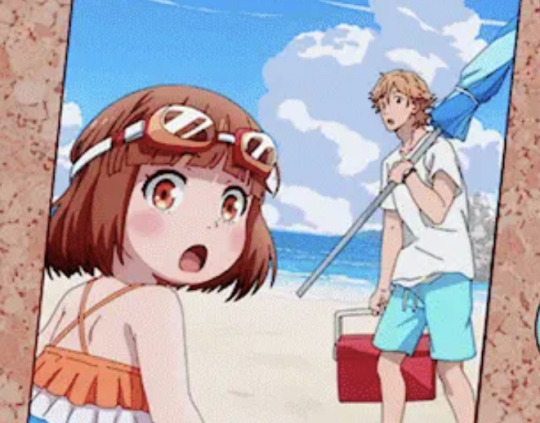
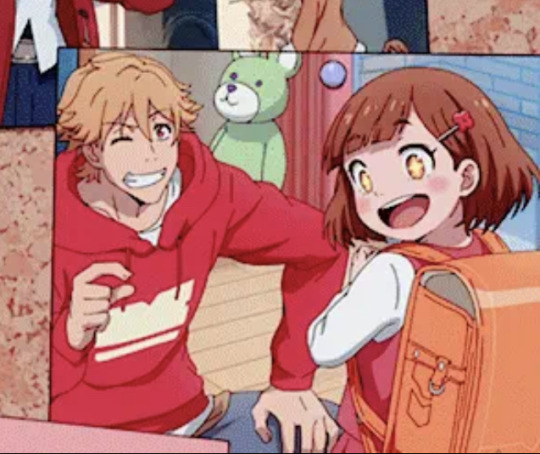
I need everyone to be aware that Rei took these photos SPECIFICALLY that beach candid
#love the idea that he picked up photography as a hobby so he can take a bunch of high quality family photos whenever#but the candid? that one is rlly special#he saw a nice family moment and immediately took the photo without even prepping kazu and miri#I could do a whole meta analysis on that alone it’s so special#I bet if you went throw his phone it’s nothing but family pics#buddy daddies#buddy daddies kazuki#kazuki buddy daddies#kazuki kurusu#buddy daddies rei#rei suwa#kazurei#rei buddy daddies#miri unasaka#miri buddy daddies#buddy daddies miri
3K notes
·
View notes
Text
Babylon 5 S03E16 War Without End: Part One
previous episode - table of contents
From the preview image that Tubi chose for the episode I see that Sinclair's back?? My old friend!! As well as our first glimpse at Minbar outside the Grey Council chambers, I believe! It's beautiful: very sculpted in a sort of sci-fi Rivendell way which fits the Minbari's space elf vibe.
Entil'Zha is being presented with a sacred box, which has waited for over 900 years..in which there is a letter for Jeffrey David Sinclair! Dun dun dun. Prophecy is real, Babylon 5 is a high fantasy as much as it is sci-fi.
Another prophecy, this one of the sci-fi variety: Babylon 5 gets a transmission of Ivanova calling for help, saying "they're killing us."
This show gives me so many fanfic ideas and I haven't looked to see if anyone else has done them yet, because I'm avoiding spoilers. So I really don't go looking for info on B5 or interact with fandom works much. But this episode reminds me that I keep toying with the idea of an AU where Sinclair never leaves at the end of s01 and the whole plot plays out with him. I miss him, he got into my heart so fast and I had no inkling he was leaving the show till well after I was attached.
It's nice to see Sinclair has had Minbari friends in his time running/recruiting/training the Rangers from Minbar.
Partner just asked me what my predictions were for Sinclair and then when I went on a ramble just stared at me and told me to write it down. So here: my prediction of Sinclair's fate. In a separate post, because it's a bit too much of a tangent.
I've paused for long enough for only being six minutes into, so we're going to move on now, but if you wanna hear meta thoughts on what I think might happen with other characters end games, I could ramble about it.
Ivanova: this recording is fake. my analysis is based on logic: I didn't do it, ergo it is fake.
Garibaldi, living for some sci-fi shenanigans: what if it's time travel.
They have Garibaldi positioned poorly before a dark path in the backdrop and it looks like he has one, huge pouf of hair sticking out one side of his head, lol.
Sinclair's back on Babylon 5! Zack Allen is in plainclothes, so perhaps all staff have the option? Or Zack wasn't invited to their special senior staff matching uniforms?
Delenn being a drama queen. It's one of the qualities they hire for on the Grey Council.
Lennier: "It must be done or the dream will die, and countless others will die."
o m in o u s
Eight days since the last Vorlon attack, per Marcus.
Sinclair looks so good in Sci-Fi Rivendell clothes. Eeeek, I missed him, I love it.
Oh it's Zak? Zap? Zathras? Yes! Zathras! Wow, I wasn't sre he'd be back, let alone that he'd be in shenanigans with DraalPlanet, OR that DraalPlanet would be doing something with time travel!
And Sheridan! Is also wearing Minbari fashion! Some very snazzy robes over his uniform.
Ivanova's message from the future is so grim. The captain is dead. "They" are coming in all over the place. External cams: Shadows. The Shadows have weapons lock. Explosions. Seems pretty straightforward and I bet it'll play out exactly like that with no twists. :P /hah
As Sheridan is doubtlessly about to find out, it's always going to be a normal evening when you are asked to swear you trust someone with your life before events can commence.
Delenn has a powerpoint presentation about the Shadows. And a battle where the shadows were driven from their home, Zha'Dum. But the Minbari were losing at the time. Until Babylon 4 appeared! Delenn says without Babylon 4, they would have lost the war.
Even while Babylon 4 was in construction, the Shadows attacked to destroy it. And the White Star was there! Delenn says they must go through the temporal rift that Draal is widening, protect B4, steal B4, and send B4 around in time. End Presentation! Everyone agrees with her flawless logic. And because she brought receipts in the form of video archival footage from DraalPlanet's surveillance system: Epsilon 3.
That I didn't see coming, either. But like Garibaldi, I am so on board for the sci-fi hijinks.
Oh, Delenn's plan goes farther! She and Sheridan will take B4 on the entire time travel trip and personally fight in the historical fight against the Shadows. Ten thousand years ago, right??? Damn, Sheridan and Delenn are going to stride through time and strike titanic, decisive blows in a war that felled entire species of sci-fi space gods!! That's so fucking epic.
Ivanova is floating the idea that she was calling for help from an alternate timeline. But Garibaldi thinks it's the timeline they're planning now, where they take B4.
I'm sure that SInclair's quippy references to Sheridan are super funny, but sadly I do not get the references.
Zathras is here again. I...don't get Zathras. He's ehh funny. But extremely plot useful! Sinclair is meeting Zathras for the second time, but for Zathras it's the first time. But Zathras is well-informed, because he's very super honored to meet Sinclair and Sheridan, but also that's on the list of things Draal told him not to mention.
Ahh, this Sinclair has already lived through the destruction of Babylon 5! He's already experiencing the world nonlinearly and is trying to do differently on this loop - damn! Or he's having visions from an alternate timeline but at some point you gotta agreee those are almost the sme thing, structurally, experientially, and thematically.
Time travel requires the use of devices that act as anchors. Zathras is handing them out and they're all being clipped visibly on a belt or sash, thus guaranteeing that someone will lose theirs. Sinclair?
Aww, Sinclair sees Delenn and Sheridan holding hands and smiled. That makes me wistful for the Sinclair/Delenn endgame that exists in my personal, unwritten AU.
Garibaldi is due an arc of making good, upstanding decisions and not doing police brutality so it hits extra hard when he blows up with Babylon 5. Or he makes it two more seasons, idk. I wouldn't mind if they lost a few characters and he was one of them.
Especially not if we could swap him for Talia back. I can't decide if I think she (or her personality that got overwritten) will be back or not.
The White Star has been ugraded with Vorlon skin, so it deflects attacks better, which Sheridan affects to be unimpressed by.
Garibaldi guesses "Hello, old friend," as the password which Sinclair used to lock a goodbye/sorry video Sinclair left for him. Which makes me softer for Garibaldi. That's what I think of when I think of Sinclair, too!
Oooo, Sheridan's time stabilizer got hit and now he's unstuck in time. Space is big. Hope he lands on something with an atmosphere. Delenn can pick him up later, I'm sure.
Sheridan always automatically turns to Delenn for backup, but Sinclair automatically turns to Ivanova, and I love that.
Sheridan just time traveled to the future where Londo is the Emperor of Centaur! And it's "just in time to die."
Are they currently losing a war in the future? Perhaps Centaur is now a holdout in the war for existence against the Shadows in an alternate future and Sheridan will be meant to save the future as well as the past?
So funny how taken aback Delenn is that Sinclair speaks Minbari now. He lived there! Marcus, who was being trained as a Ranger there learned Minbari as what he implied was a necessity. But Delenn is so surprised. Their heart to heart is so sweet. *shipping intensifies*
Back to the future! Sheridan and Londo seems like he's blaming other people for his own support of the Shadows' agenda coming back to bite Londo and Centaur in the ass. "Ohhh if only you'd joined me in collaborating I wouldn't have had to face any consequences!" He'll get everything he ever thought he wanted and learned that being Emperor lost him everything he'd ever cared loved.
That's a pretty good hook and a cliffhanger. And a ton of interesting information was revealed! It's too late for Part Two tonight but I pinky-promise I will watch it tomorrow. I wrote up some predictions after I did a Sinclair one and an other-characters one before I watched...
War Without End: Part Two
#babylon 5#woodsfae b5#jeffrey sinclair#john sheridan#delenn#susan ivanova#michael garibaldi#londo mollari#zack allen
21 notes
·
View notes
Text
This comment was left on my post on Judd Winick’s Jason:
#i still dunno how i feel about jay showing up in star city to ~recruit mia (for lack of a better word)
by @natasharomanovofficial and I don’t really think he was trying to “recruit” Mia. But it’s a whole thing on its own, so, separate post!
This is going a bit into meta and character analysis, specifically around Green Arrow Vol 3 69-72.
While it’s not uncommon for heroes and villains to have team-ups and appear in each other’s books, aside from the fact that GA was written by Judd Winick at the time and he was one of the few writers at the time who actually liked Jason (why did everyone hate him so much? Just for replacing Dick who had kind of outgrown Robin? Jeez), on the surface, it might be confusing why Jason would bother fucking around in Star City with Brick and Ollie. Especially since, while very world-traveled, he has always been very Gotham-centered. And if he was just, y’know, doing weapons deals with Brick as was what was initially displayed (and apparently a cover) it could have been mentioned in passing in Batman or GA, no need for a whole story.
But while Jason is supposed to get weapons from Brick and teams up with him against Ollie and Bruce, (which I will now show you because it’s fucking hilarious)

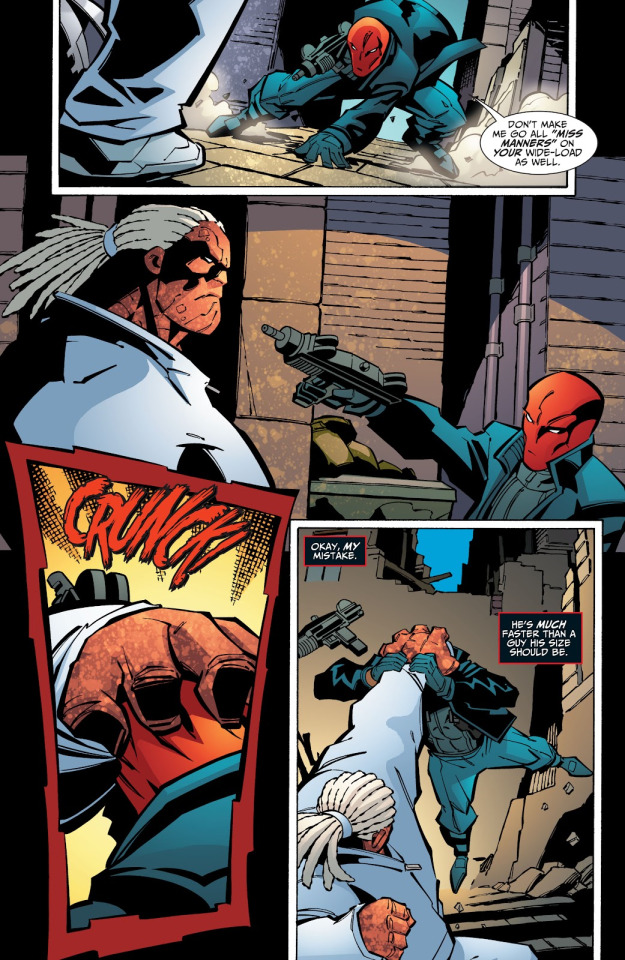
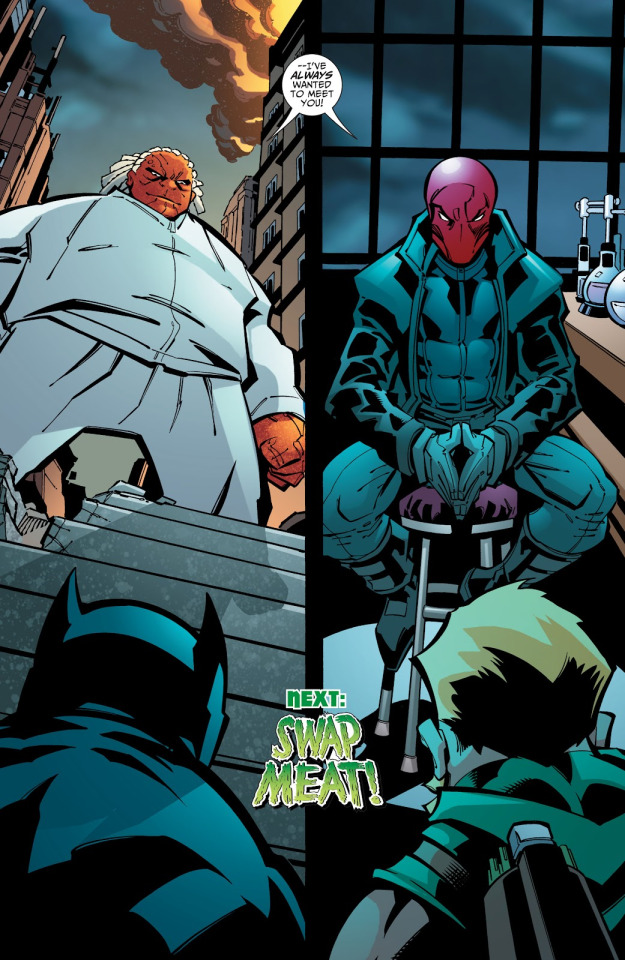
the key, his goal, is Mia Dearden.


Now I am admittedly relatively new to my interest in the Arrowfam (and my interest has mostly centered around Roy and Lian with Dinah sprinkled in for flavor), so I am unfortunately no expert on Mia just yet. Doesn’t help that there’s been no hide nor hair of her since the reboot of the New 52. Come on, Rebirth era, bring her back!
However, I am capable of reading wikis lol. Also, context clues.
So, what makes Mia so special that Jason would take a crew and leave home just to talk to her? (which, in the end, is pretty much all he does)
Let’s break down the confrontation!
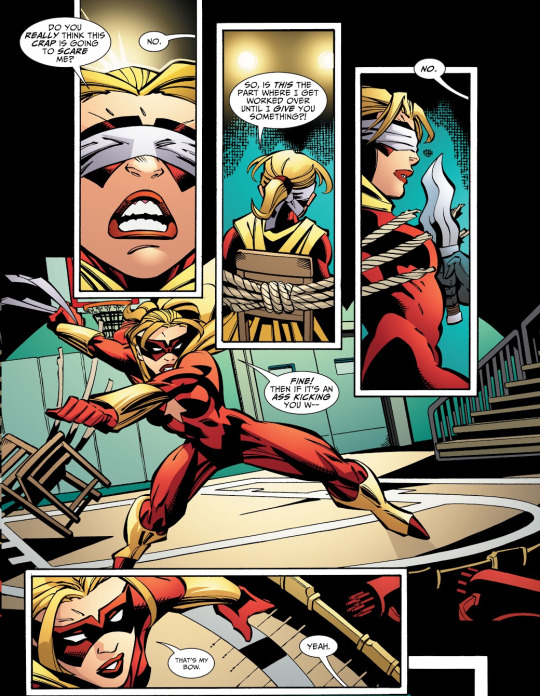
Jason is a dramatic bitch, but also in general inherently intimidating. He’s a big strong crime lord from Gotham’s worst neighborhood (which says something because it’s fucking Gotham) who has Bat-training, world-wide Talia-approved assassin training, and of course, was beaten and blown up by the Joker, revived through no known means(in-canon, but it was SB Prime because he punched the universe), and tossed into a Lazarus Pit. He’s scary.
But he doesn’t expect Mia will be scared. He knows she’s tough and brave and been through very familiar hell. He’s not locking her down and keeping her helpless either. She’s tied up and knocked out so she is forced to confront him alone, but as soon as she’s conscious, he lets her go and gives her her own weapon. Plus, she has home field advantage--not only is it her city, but her school gym. She’s in a familiar environment while he’s not.
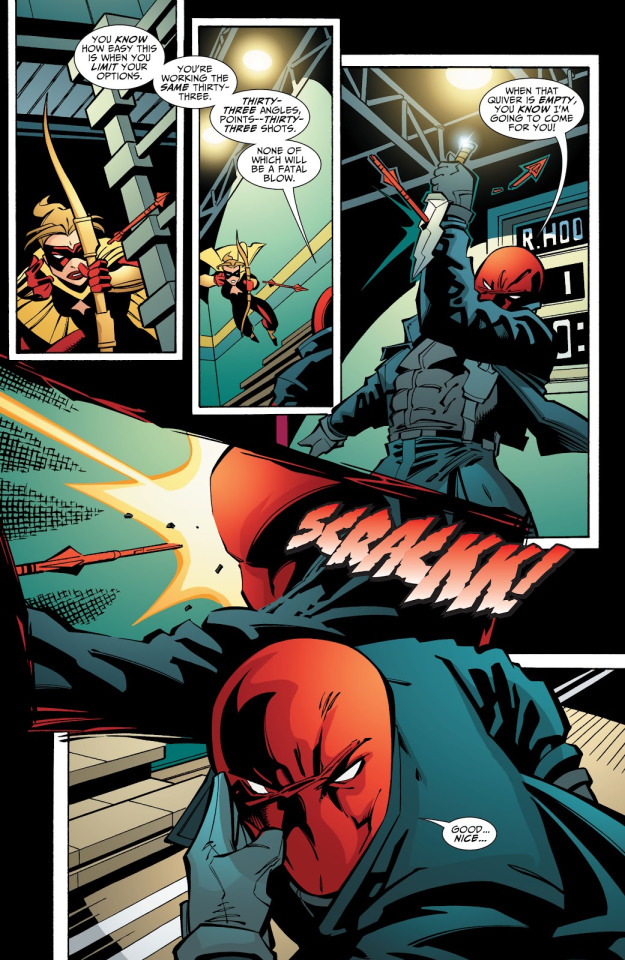

This is partly a test and partly proving the point he’s always trying to prove: sometimes, lethal force is necessary.
He’s not even really trying to hurt her while making his point. When he manages to successfully break her weapon, he gives her his own swords. And he gives him her two blades while he keeps just his one flamberge-type dagger (which is so fucking cool btw why doesn’t he have that anymore? It’s so pretty!). And he takes off his protective helmet. He’s giving her advantage after advantage.
And then we get to his point.
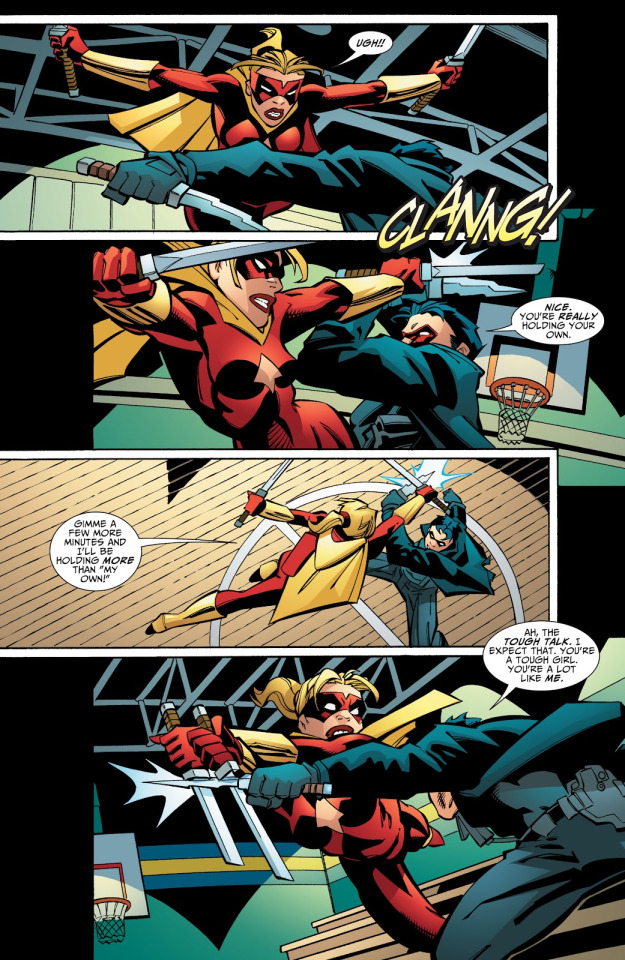
“We’re not so different, you and I.” Really, Jay? That’s incredibly cliche even for you, you over-dramatic crumpet.
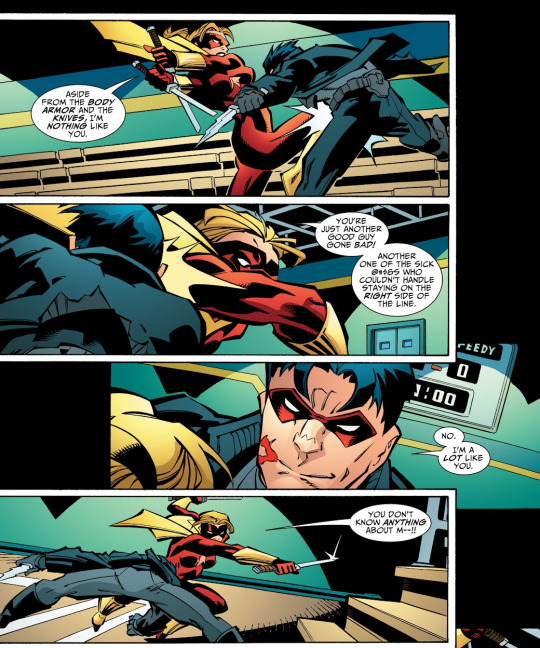
Except Jason is a detective by trade and he does his research. He does know about her.
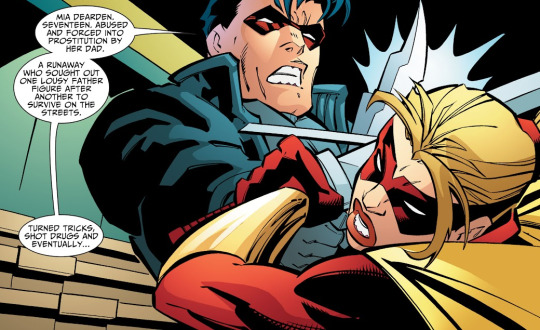
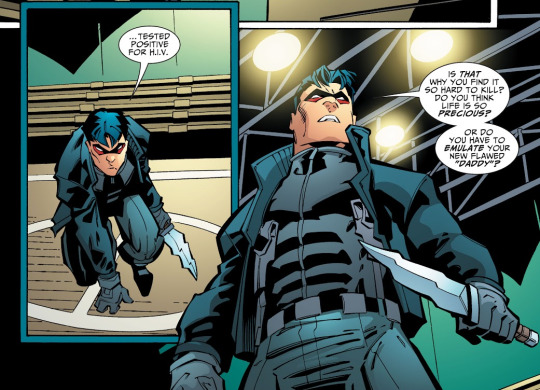
So, obvious parallels out of the way first. Jason and Mia are both abused children forced to live on big city streets, surviving by any means necessary, and eventually being adopted by a wealthy playboy vigilante to escape from another abusive situation. They were also about the same age when they were left on their own. While Jason’s father was arrested or killed before that, he was on his own when Catherine died by the time he was 12. While I have no idea about her mother, Mia ran from her abusive father and was on the streets at age 11.
There’s also the drug history. Mia apparently “shot drugs” (which I honestly am not sure means she was an addict or a seller but either way) while Jason watched his addict mom die, and is now a dealer himself (with an explicit rule against dealing to children).
Another important thing to note: this conversation is part of the reason--well, most of the reason, honestly--that people think Jason might have been a child prostitute.
(one other entirely irrelevant similarity is, apparently, both of them like to read! neat little tidbit there.)
But there’s also a meta-textual similarity here.
Did You Know? Jason Todd was initially intended--sort of--to die from AIDS instead of explodified by Mistah J!
This is only because of Jim Starlin, known Robin-hater and writer for Death in the Family.
“Well, I always thought that the whole idea of a kid side-kick was sheer insanity. So when I started writing Batman, I immediately started lobbying to kill off Robin. At one point DC had this AIDS book they wanted to do. They sent around memos to everybody saying “What character do you think we should, you know, have him get AIDS and do this dramatic thing” and they never ended up doing this project. I kept sending them things saying “Oh, do Robin! Do Robin!” And Denny O’Neill said “We can’t kill Robin off”. Then Denny one night got this flash that “Hey, if we get this number where people call in and they can vote on it, they can decide whether Robin lives or dies.” So that’s how it started. I wrote up two endings and the readers came in and voted and I think it was 93 or something, it was this negliable amount, the difference for him to be put to death. And the death won out of course.”
Okay, first of all, fuck that guy. No “let’s have Jason retire” or “let’s make Jason grow up” or “let’s ship him off to boarding school” or something, just jumping straight to child murder. Coolcoolcoolcoolcool.
But also, here’s what Judd Winick had to say about that idea.
"I think it was a stunning, unbelievable thing. In the time of fears and epidemic, to have had a superhero have it, I was stunned and proud to hear about that. But they were not able to do it. I always forget to ask Denny [O'Neil] about that, about what happened.”
Which, fair. This is what he’d said just before that, when asked, actually, about Mia!
"The way that came about was actually a lot like how I ended up bringing Jason Todd back. [...] ...when it was my turn, I said 'I think she should be Speedy, and I think she should test positive, and one should be about the other'. In the face of a potentially shortened lifespan, it wasn't 'I'm gonna die real soon', it was 'every little bit of it matters, should go towards something'. It was that she could give something, not about when she was gonna die. That was always my point. It made sense."
So Judd Winick knew about the idea of Jason dying of AIDS when he decided Mia would be positive for HIV, and subsequently writing this Red Hood vs Speedy story.
Now a small science interlude because I too am a huge nerd who must know everything.
In the off chance you don’t know, HIV (human immunodeficiency virus), if not treated, can lead to AIDS (acquired immunodeficiency syndrome). They are, as the name suggests, viruses that attack the immune system of the host, weakening it and causing a whole host of problems.
Jason’s demise and the plotting thereof was in the 1980s. This was early in the epidemic, and there were certain perceptions regarding the disease. HIV and AIDS are transmitted through body fluids mostly. If Jason had got it, technically it could have been something as simple as accidentally getting a positive person’s blood on him in a fight. But the most well-documented means of transmission were injections and sexual contact. Now, there’s also the chance that Jason could have gotten it from a bad transfusion. A story also could have been made of him dealing with drugs, which I find less likely--though possible I suppose--considering his mom. Though he could have gotten it from her while caring for her. So many ways it could have gone. But it’s worth noting, it was especially common among not-straight men, hence the increased stigma against gay men. This is also a big and dumb part of why people have to not have had same-sex sexual contact for months prior to donating blood. I hate this fucking country.
Educational rant and theorizing over lol.
TL;DR for that part, Jason could have been given AIDS which is a metatextual parallel to Mia having HIV that was not purely accidental since the writer knew about the idea.
MOVING ON!
Getting to Jason’s point.


Jason has her on the ropes. He has her pinned down and immobile. He has her disarmed and his hands on her throat.
And then he backs away.
He connects with her. They have a common history. He knows first-hand that Bruce could never kill anyone no matter how vile, and Ollie has similar values (if not the same because, well...Ollie has killed people. But y’know.).
In my personal opinion, he sees Mia as potential for how things could have been. Robin is the light to Batman’s dark, but Jason is also the down-to-earth and wordly-aware from a harsh life compared to Bruce’s sheer privilege. Mia has the opportunity to be both for Ollie, and to make the hard choices he can’t.
But Jason doesn’t force her to do anything.
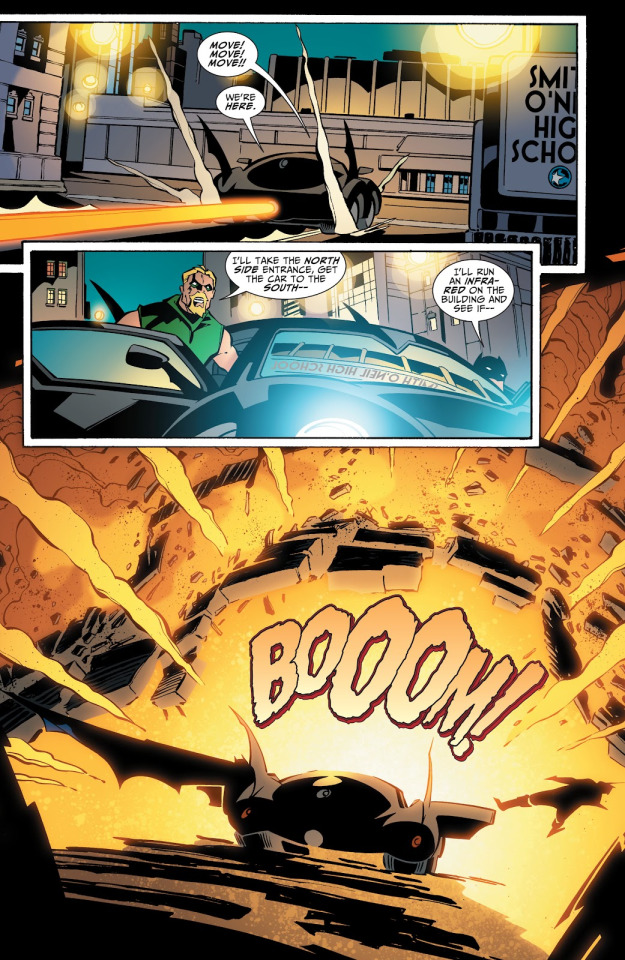

He lets her go.
(with a little explosion for flavor because he’s a dramatic bitch like that)
He just wanted to “teach her a lesson”. This was literally an educational venture. He extremely literally took her to school.
He schooled her oh my god I’m just getting that now holy shit.
Jason Todd, you absolute literary nerd, you are the fucking worst and I hate you and I love you.
This, to my knowledge, is the last we hear about it.

But Mia’s still thinking about it. Jason’s words got to her on some level. She knows he’s right about some things--they are very similar, and yeah, maybe some people deserve to die.
But Jason is so frequently used as a cautionary tale--the Robin that screwed up--that she is not going to become him.
But maybe that was also part his plan.
Don’t be me. Be better.
But I guess that’s just a theory.
A Comic Theory thanks for--
#Jason Todd#Red Hood#Green Arrow#Speedy#Mia Dearden#DC Comics#Bruce Wayne#Batman#Oliver Queen#Brick#Daniel Brickwell#Robin#A Death in the Family
99 notes
·
View notes
Note
I must say, you must be one of my favorite South Park meta bloggers! I also think Stan is best boy, and I relate to him so much. I just can’t get enough of your analysis. I’m curious though, why do you ship Style, and what are your thoughts on how the fandom portrays the ship? Style is a ship that means dearly to me. I’ve always found the evolution of their friendship in-canon so fascinating, and I remember how back in the day, Style was literally booming with so much content, but there are definitely some portrayals of the pairing in fan-content that has me feeling “weird”.
Aw thanks!
I do disagree with a lot of Stan (and Style) portrayals. I think the big thing is that Stan or Kyle are probably going to be the two most people relate to, especially if they ship Style. So when they relate to one or the other it comes with inherent biases. Like I relate to Stan much more than I relate to Kyle, so it's easier for me to see his perspective, so it's easier for me to be biased in his direction. I think writing them neutrally is pretty hard for a lot of people, especially when Stan and Kyle have caused each other pain. Because of that I think it's pretty common to veer into one or the other just constantly being a huge dick no one should ever put up with. Instead of what they both are which is just, dicks the way most normal people are dicks. Good people, but fallible.
Stan and Kyle have the potential to be genuinely good for each other. With them fighting/not relying on each other as much, it's easier to forget that they make a good team. And with South Park being as it is, it's also easy to forget they probably haven't been fighting for that long, even if it feels like forever.
I think a lot of their problems come down to the fact that they actually love each other so much that they have a hard time communicating. Stan's been more closed off and telling Kyle less than other friends post-Ass Burgers. Kyle's been more critical of Stan's behavior post-Ass Burgers. And it'd be easy to chalk that up to them just not liking each other anymore, but that's not it. When it comes to Stan being depressed:
Stan's not bringing it up because he's scared if he does, it will make Kyle hate him again, the way he thinks Kyle started to when he said everything was shit. Kyle's not bringing it up because he's scared that if Stan's still cynical, it means Stan (still) hates him the way he seemed to the whole time he was saying everything was shit, because he was one of the things Stan saw as shit. There's a lot of hurt that they haven't brought up with each other. They're kids and they love each other, and they hope that not-talking about it will make it go away like the little rifts they had before did. The problem is that those smaller fights are things that, maybe, they actually could get over on their own without needing to have a whole conversation about it. This isn't. They're pushing each other away, involving each other less, trusting each other less, because they actually don't want to lose each other.
This is the kind of thing I think can get healthier with age, with experience, and even with time apart-- I don't necessarily think that taking a break after the Vaccination Special is bad for them. They're both too close and have too much invested to keep digging at the issue while it's fresh. It's a way for them to grow while apart, but HOPEFULLY come back together in a way that's healthier, after they've really worked out who they are alone.
I like a lot about Stan and Kyle's relationship. When they're operating at their absolute peak, they love each other but still call each other on their bullshit. Or they even don't call it out, and instead let the other figure out that they disapprove without even saying one word about it, and that's enough to set them back on the right moral path. They aren't the same person, they have different goals, different motivations, different flaws and strengths. But they get each other. They love each other. When one's trying to do something and it makes sense, they'll support it even if they wouldn't do it on their own. Because it matters to their best friend.
When one's struggling, they'll try their best to fix the problem, even if it's a problem they wouldn't have, either. They've supported each other through good times and terrible times. They've even in a marriage cliche been there through sickness and health-- Stan's depression has thrown a curve ball due to the toll it took on both of them, but when Kyle needed a kidney, Stan was there. When Stan was struggling with his freemium game addiction, Kyle was there (even AFTER them not being as close as they were before). They can and have helped each other through terrible times that could have put a strain on relationships before.
They want the other person to be the best person he can be, and they in turn want to be a better person for him. They have plenty of things both together and apart that they need to overcome, but they honestly have a very strong foundation. I think as they get older, more aware of their feelings and how to discuss them, and more secure in their individuality as they prepare to leave South Park, their relationship has the potential to be very low drama and very happy.
69 notes
·
View notes
Note
Do you have any tips on how to love yourself? I recently realised I am deeply insecure and unconfident in my value as a person and it’s manifesting itself in codependent relationships and sadness when alone. I really wanna deal with this. Thank you
Yes! I've actually been doing research on self-esteem all day for something that I'm (very tentatively) hoping will become a new project. In a meta-analysis of 119 different studies, researchers from the University of Savoie Mont-Blanc and University of Grenoble Alpes found that cognitive behavioral therapy had the biggest impact on improving self esteem. Cognitive behavioral therapy aims to change our thought patterns, beliefs, attitudes, and, as a result, our behavior. It asks us to remember that our thoughts are not facts, and to notice when we’re practicing distorted thinking- inaccurate thoughts that reinforce negative thought patterns, emotions, and behaviors. Which makes sense- to raise our self-confidence, we need to change the stories we tell ourselves about who we are and change the beliefs we have about ourselves.
So how do you do cognitive behavioral therapy? If you can, the best option is to see a therapist who specializes in cognitive behiavoral therapy. But if therapy isn't an option for you, there are at-home methods you can try as well. The first is cognitive behavioral therapy worksheets, which you can find here.
If you're like me, filling out those worksheets can be hard to do regularly, so another thing you can try is just challenging negative thoughts about yourself when they arise. Is the negative thought because of a distorted thinking pattern? Is it accurate? What assumptions am I making about myself/about this situation? Then, explore why you believe that thought. Where did it come from? Why do you hold on to it? A helpful technique here can be just asking, "why" over and over again until you get to an answer. Finally, you can replace that thought with something more accurate and more positive.
For example, you might feel that you "should" be doing something productive at all times. "Should" thinking is a cognitive distortion. It's not accurate that you "should" be doing anything, but you're making the assumption that you're a failure by not doing the thing you think you "should" be doing. Why do you feel like a failure? Maybe the answer is "because productive people are more successful." Why do you want to be successful? "Because successful people are happy." Why do you believe successful people are happy? "Because I was told from a young age that success would make me happy." Why do you still think that's true? "Well... I guess maybe I don't." Then, you can replace "I should be doing something productive at all times" with "It's healthy for me to prioritize rest and relaxation, since those are important ingredients in living a happy life."
Try to challenge your negative thoughts every time you notice them. The more you challenge those thoughts, the less powerful they'll be in your mind, and the easier it will be to get rid of them or replace them with a more positive belief about yourself.
The other thing I recommend is positive self-talk. This is less substantiated in research so YMMV, but I think it can be really helpful to tell yourself the things you like about yourself. Every morning, make an effort to look in the mirror and tell yourself one thing you like about yourself. It could be your appearance, your personality, your skills, whatever comes to mind. Keep a list of all the things you come up with each morning. You can also try sitting down for three minutes and writing a paragraph where you describe your positive qualities to yourself.
Finally, try to talk to yourself the way you would talk to a friend. Often, we're way more critical of ourselves and mean to ourselves than we ever would be to another person, especially someone we love and care about. So when your inner critic comes out, try asking yourself, "would I say this to someone I love?" If the answer is no, try not to say it to yourself, either. We're stuck with ourselves our whole lives, so we might as well be our own friend.
9 notes
·
View notes
Text
Hi, @pilotkinkade! No worries about a delay—real life and school are way more important than critical analysis of a cartoon, lol. I’m thankful you got back to me, though. I appreciate your response posted here—and no, it didn’t feel patronizing at all! I can see what you mean about things.
In terms of Wikipedia’s definition of white savior as a cinematic trope, I can see where that could be applied to the entirety of the VLD show as you mention, even in aspects to the Balmeran episode. In VLD, I do see how in every case, the largely unprepared MCs save a group of people and in doing so, usually learn something about themselves/achieve a power unlock that makes them personally stronger, especially compared to the people they assist/save, who remain without such power-ups. Or, in various other instances, Team Voltron is shown as “more enlightened” in ethics or willpower, etc. compared to the people groups they’re trying to save/convince to join their cause. That concern absolutely does make sense, and it’s definitely a problem that our paladins are placed on that kind of pedestal and that it’s...celebrated?
I also felt this line of yours in my soul, lol: “i think this is an issue with voltron: liberating a country, let alone a whole planet, is a long, tiring, bloody process. i guess voltron by its nature circumnavigates that, but. it is, to say the least, frustrating to watch.”
Yeahhh lol, I think in terms of how it handles war and heavy situations, VLD accepts a lot of “this isn’t realistic war/politics” moments by virtue of it being a Y7 cartoon? Its fantasy violence is targeted for, I guess, 7-year-old American boys... So, I think when we sensed those more adult themes and moments of realism, we wanted the show to naturally follow up on those struggles more, but I remember an interview where the dev team talked about having to cut politics because the stakeholders felt it was too adult for the target audience, RIP.
But just thinking about this larger conversation about the unsettling images and implications of VLD Voltron’s power as savior…I keep wondering if “savior complex” is in some way inherent to the franchise as a whole by virtue of how it was fitted to a young American audience back in 1984? Like, not only did the original pilots from 1981’s Beast King GoLion get white-washed for an American audience, but it seems like the whole story structure got some pretty major adjustments, and some characters got altered for better (I’d argue 1984 did humanize Lotor and other antagonistic aliens) or worse in various ways (the Voltron pilots became “foreigners” to the war they grew to fight in as the most powerful warriors, instead of the GoLion storyline of the pilots being a band of escaped slaves)…And that’s all on top of the original story being rated much higher at TV-14, while Voltron: Defender of the Universe 1984 was sanitized to Y7.
I wonder if these decisions in 1984 feed into the tangles and weird power structures/savior narrative we see in VLD?
I feel like the only Voltron iteration that really reflects on and questions the “powerful savior” narrative is the one that was rated for older audiences (16+), which is the Dynamite Comics (2011), written by Brandon Thomas...
It was perhaps one of the most innovative versions of Voltron, even though its artwork is criticized for its quality. I say innovative because Team Voltron actually recognizes that they and their machine have been fighting in the name of a corrupted Earth just interested in further conquest and corporate control of its own, and that Earth is actually no better than Zarkon or other despots. It’s a really sticky mess. So we really see Team Voltron try to disavow themselves from that past and their leaders, at the same time that the team and Drule Empire both are realizing that a far darker force (sentient rift creatures, basically) has been instigating the entire war across the universe, using Voltrons to carry out its will, and poisoning people against each other. In this iteration, team Voltron is not the most powerful, nor are they even the only Voltron. And anyone in this iteration could learn powerful magic. So it’s a really complex backstory that tries to unite long-standing opposing groups together under fairly equal powers. And while it’s clearly still got some problems, I really appreciate what writer Brandon Thomas was trying to do here. It feels like a critique on DotU 1984’s mentality around Voltron, while also reaching back to Voltron’s 1981 Beast King GoLion origins—in which, in that version, the pilots were actively victims of the war and had intense, personal reasons for further involving themselves to stop Zarkon.
VLD seems to lift a lot of plot points from the previous Dynamite Comics, along with GoLion. But in doing so, VLD seems to strip out a lot of involved backstory and the past gray morality of Voltron itself. Which seems to reverse the reboot back to its 1984 “yay we’re here to the save the universe” fluff.
An anon recently joined in on our discussion here to suggest that maybe the trope we’re looking for regarding Allura specifically is called “xenos savior trope”? Which appears to be in reference to the larger genre concept of a foreigner of any kind outside the group being the only one who can actually save the day/that group. So it seems to be related without necessarily taking on some of the criteria I suppose I apply to white savior complex specifically….
About Allura’s sort of “Chosen One” hyper-abilities even as an Altean… You’re right that the show isn’t terribly explicit about it. Episode 1 prefaces some of Allura’s powers by referencing that they exist because her life force is tied to Voltron. I talk about it in an old meta here if you’re interested. (I also have this other meta too, where I try to argue that seasons 1-5 have details suggesting Alteans aren’t inherently a master race, but that world-building contradicts the latter half of the show which hinges on that master race concept. But the meta itself also gets into the screenshots about Allura’s life-force tie and her abilities vs. Alfor’s.)
Ultimately, the show certainly doesn’t take time after episode 1 to reiterate why Allura would be so special, but her tie to Voltron is the only thing I can think of for why she’s on such a different level even from Honerva or Alfor, both of whom also made it to Oriande.
I keep thinking about what it would mean to fully update VLD for modern audiences, and I wonder how things would have felt if every major race involved in the war’s scope were still represented by the paladins (reflecting the s3 OG paladin diversity, which did feel really cool). And if everyone had magical abilities but simply that different cultures had different understandings or uses of it—but that they weren’t inherently incapable of learning another’s way. I wonder how much that would have changed VLD as a show…
#Voltron#Voltron meta#Voltron critical#Allura#Alfor#VLD#DDP#Voltron Dynamite Comics#this is a really interesting discussion and thank you for continuing it with me#Lots of complex issues all happening at once
16 notes
·
View notes
Text
Love’s a game, wanna play? A meta-analysis of the game of love and Taylor’s love of games
—
Before actually getting into this, I’m obligated to make the disclaimer that this is just my interpretation of some songs. I’m not claiming to be “right” about anything. I have no way of knowing whether my observations will hold true if/when Taylor releases more music. It doesn’t really matter. There are many ways to interpret music.
Games are not the only extended metaphor in her discography; if you understand one, you don’t necessarily understand them all. This essay is an exploration of how one particular metaphor could be so effective.
In addition, I am often the first person to say that “not everything is that deep.” Yet here I am, making something deep. I was only mildly curious about this metaphor at first. In the process of documenting my understanding, I surprised even myself as I realized how rich this metaphor is.
A warning…this essay is very long. (It’s either mildly interesting or completely ridiculous and nothing in between. Likely the second.)
—
The notion of a ‘game’ is often conflated with the notion of adversarial conflict. This misunderstanding is largely due to Western structural/cultural forces. Mathematicians and economists have a passion for framing most predicaments as zero-sum, or strictly competitive, where one player’s advantageous move by definition disadvantages their opponent. But collaborative and otherwise not strictly competitive games exist too.
Taylor’s fascination with games spans her entire discography. Artistic preoccupation is reason alone to analyze her work from such an acute angle. But pleasantly, Taylor also does not share the academics’ favorite pastime. She strays away from the zero-sum bias in very unpredictable ways. In fact, she has no bias. She prefers to mix and match her language to each situation as she sees fit. Her convolution of love and games is expressive, divorced from the logical framework by which games are defined. I think examining this facet of her work with a fine-toothed comb may be especially illuminating.
It seems counterintuitive to argue that games could (or should) be anything more than Taylor’s favorite metaphorical manifestation of logos. Yet revisiting a metaphor is itself communication, conscious or not. Advancing an understanding of this extended metaphor, in my opinion, substantiates what is usually intangible about Taylor’s songwriting brilliance.
On Games
Precocious and perceptive, Taylor has, for as long as she’s been writing, placed competition, strategy, and collaboration alongside conflict. Therefore, for the sake of coherence and relative brevity, analysis is scoped only to songs with significant mentions of games, puzzles, or game-related imagery. ‘Games’ are not conflated with general fighting, trickery, toying, revenge, mention of rules/strategizing, or winning/losing. ‘Puzzles’ are not conflated with disorder; puzzle pieces must be pieces of a larger, vivid picture.
Consider football. Imagery of high school football makes “Miss Americana & The Heartbreak Prince” fair territory. Someone shouting over a football game in a bar does not qualify “Mean.” The football helmet worn in “Stay Stay Stay” is an absurd and compelling detail in context, as likely to be fictitious as it is true, and hence more significant than a televised sporting event; “Stay Stay Stay” qualifies. In essence, games are interesting as a device rather than a simple detail.
Below is a list of the songs with significant game reference(s), categorized by implied type. Note that a song can belong to multiple categories if it contains multiple references.
Generic/unspecified games: “Come in With the Rain”, “Dear John”, “State of Grace”, “Blank Space”, “Wonderland”, “…Ready For It?”, “End Game”, “Look What You Made Me Do”
Card games: “New Romantics”, “End Game”, “Cornelia Street”, “It’s Nice To Have A Friend”
Dice games: “Cruel Summer”, “Miss Americana & The Heartbreak Prince”
Board games: “Dear John”
Sports/contests: “The Story Of Us”, “Long Live”, “Stay Stay Stay”, “End Game”, “Miss Americana & The Heartbreak Prince”
Puzzles: “Red”, “All Too Well”, “So It Goes…”
Other: “It’s Nice To Have A Friend”
Like many people, Taylor habitually seeks structure to manage unpredictability. (Games provide structure for situational volatility, hence her artistic love affair with this metaphor.) The stylistic choices she makes to entertain this habit, however, are anything but consistent.
The games have a variety of different players, such as in “Dear John” and “Look What You Made Me Do.”
She does not establish strict parity between characters’ emotional affiliation and the competitiveness of a game. “Dear John” features an adversarial game. Conversely, her partner in “Blank Space” is a co-conspirator/collaborator. “All Too Well” analogizes autumn leaves as puzzle pieces; puzzles are collaborative games.
Taylor famously claims that love is a game in “Blank Space.” This song is colloquially understood to be about the love story we see play out in the media. Games can thus include all parts of her ‘love life.’ Arguably, she foreshadows this in “Long Live” by intertwining parts of her ‘America’s sweetheart’ image with professional success, which is derived from writing about love.
Taylor is not always a player in a game, such as in “Cruel Summer.” Her partner may not be either; see the crossword in “Red.”
In short, humans are unpredictable, as is love. It is clear that Taylor uses games as an incredibly powerful metaphorical device. They are a genuine reflection of her feelings about love.
Musical analysis usually begins with careful consideration of each track. Given a disparate and lengthy list of songs, it is probably more fruitful to go up a layer of abstraction. Of particular intrigue for this set of songs is the relationship between time and Taylor’s willingness to divulge more information about a metaphorical game.
We revisit the set of songs to list them in chronological order. The purely ‘generic’ songs are now bolded: “Come in With the Rain”, “Dear John”, “The Story Of Us”, “Long Live”, “State of Grace”, “Red”, “All Too Well”, “Stay Stay Stay”, “Blank Space”, “Wonderland”, “New Romantics”, ”…Ready For It?”, “End Game”, “Look What You Made Me Do”, “So It Goes…”, “Cruel Summer”, “Miss Americana & The Heartbreak Prince”, “Cornelia Street”, “It’s Nice To Have A Friend”
Specificity about a game seems to decrease with proximity to the 1989 era.
Lyrical imprecision in “Come in With the Rain,” a true outlier, probably boils down to youth.
“State of Grace” is a preamble about the themes of Red. “Begin Again,” though much later on that album, shares the same inspiration as “State of Grace.” Red is constructed as a sandwich between these two songs which present the album’s thesis. The album considered as a whole is thus a buffer for 1989.
reputation is a buffer for 1989 because the ‘generic’ game songs are heavily and intentionally front-loaded.
“New Romantics” is a coda for 1989, and its poker game reference is slightly ambiguous. What, exactly, is poker; what is all in the timing? The thematic material of “New Romantics” is most similar to that of “Blank Space.” ‘It’ is the same crude game played in the earlier track, the affair of collecting men. Perhaps this close relation subsumes “New Romantics” under the ‘generic’ game category. (Though this is a loose explanation.)
There exists an undeniable chronological pattern to game characterization. If you graphed the amount of game-related lyrical obscurity versus time, it would look like a shallow sand dune with the tip at the 1989 era. (Or a hill. Or a big pile of leaves. You get the picture.)
Armed with a basic understanding of Taylor’s career, one might say that her desire for personal privacy manifests as reticence to define metaphorical games. The 1989 era was the height of media attention on her. This caused more than a few issues. The art created around this time would have naturally reflected how she felt about the public eye. (See: the entire reputation era.)
But isn’t Taylor almost as famous as ever today? Sure, her name is not as saturated in the zeitgeist as it was in 2014. She’s still one of the world’s mega-stars. And does she not have a very private relationship today? Taylor’s work reflects her hardened personal boundaries, but boundaries alone do not explain the pattern of how she writes about games. Otherwise Lover would be filled to the brim with songs about ‘generic’ games.
To summarize, Taylor uses games as a perennial favorite metaphor to frame her experiences of love. Increased public scrutiny undoubtedly changed the way that Taylor approached songwriting; even so, fame was not a factor that changed how she wrote about games. The connection between time and types of games suggests that we cannot consider game metaphors in isolation.
On Love
The next piece of the puzzle (no pun intended) is what she shares about love. Which 1989 songs are most revealing? Technically…most of them, if you think hard enough. I’d like to draw special attention to “Wonderland” and “You Are in Love.”
Ah, “You Are in Love.” The musical gift that keeps on giving! Fitting, because true love should be too.
In “Wonderland,” Taylor says:
It’s all fun and games ’til somebody loses their mind
Shortly thereafter in the “You Are in Love” bridge, she proclaims:
You understand now why they lost their mind and fought the wars
And why I’ve spent my whole life trying to put it into words
Taylor reverses her opinion about the prospect of losing her mind for love. (The abruptness here is a consequence of a real-life relationship change, plus the fact that both of these songs are bonus tracks.) Of course, she also tells us an important connection between love and games.
I’ll pause here to say that I’m not going to turn this into a (frankly uninteresting) relationship timeline/proof post. But may the profound significance of “You Are in Love” and its subject never escape us.
“You Are in Love” is written in the second person. Taylor is the intensely guarded ‘you.’ We witness her emotional walls get broken down by her lover, the ‘he.’ Fascinatingly, Taylor departs from the second person point of view in the bridge. Suddenly, she alerts us to the presence of an ‘I.’ The bridge says that ‘you’ Taylor, whole and normal-person-in-a-relationship Taylor, finally understands true love. In the same breath, ‘I,’ writer Taylor, admits that she’s had it all wrong for years. (This is not to say that her writing pursuits before this moment were pointless.) Therefore, breaking the second person point of view to include the ‘I’ line shows that Taylor distills the nature of true love in that ‘eureka’ moment.
Yet she exposes the schism of writer Taylor and whole, normal person Taylor in a moment where, in theory, those two roles could not overlap more. Taylor has every reason to faithfully represent her feelings. Her sentiment is always sincere even though she may falsify details of a story. “You Are in Love” is (as far as I’m aware) the only song in which Taylor ever blatantly admits to writer-person misalignment. The schism must run extremely deep.
Taylor was—and surely still is—drawn to songwriting as a means to explore love. She tries to to capture its enigmatic essence with the written word. How fascinating it is that, at the very moment she communicates her deepest understanding of love, she says that the part of her that puts it into words is inherently disconnected from her spirit which feels it.
On Games And Love
We must briefly table the meta-implications of “You Are in Love” to return to the topic of games.
Love probably would have stopped feeling like a game after finding a real gem of a person who doesn’t mess with your head. (Love also probably would have stopped feeling like a game after dialing down on brazen PR tomfoolery.) Taylor has written several albums about her true love. It’s easier now to trace the arc of her feelings: it is a positive path, as anyone would predict.
Why would she continue to write about games after 1989? The obvious answer is that she likes doing it. It remains a useful metaphor.
But recall that chronology discourages us from considering metaphorical games in isolation. To clarify the principal function of the game metaphor in her discography, we must consider the writer-person dichotomy.
First, note that Taylor exposes the writer-person dichotomy in an honest, vulnerable moment. She confirms it as a human phenomenon. The phenomenon thus must extend beyond a singular moment during 1989. Distance between writer Taylor and whole, normal person Taylor—a measure henceforth called writer-person distance—is necessarily a function of time. Coincidentally, so is the measure of game-related lyrical obscurity.
Writer-person distance can grow or shrink. It was small in her youth; this is what pushed her into songwriting. It is small now, as she has told us in the albums since 1989 that true love has stitched her back together. Again, because writer-person distance is a human phenomenon, it changes slowly, smoothly. (“You Are in Love” simply marks the biggest distance.) Does this sound familiar? If you graphed writer-person distance versus time, the graph would look like a shallow sand dune with the tip at the 1989 era. (Or a hill. Or a big pile of leaves. Once again, you get the picture.)
To summarize, game-related lyrical obscurity and writer-person distance are smooth functions. “You Are in Love” is the inflection point of both measures.
With “Wonderland” and “You Are in Love,” Taylor tells us that games are linked to how she conceptualizes love. But not just any love. 🎶 True love. 🎶
At the same time, Taylor presents “You Are in Love” as a dividing line between ‘that which is a best attempt to understand something that inherently cannot be captured’ and ‘that which refines the thing that, against all odds, was captured.’ Our interpretation of games must synthesize an abrupt ‘eureka’ moment with both the measures’ gradual changes.
If we are to talk about metaphorical games, we also must talk about true love. But we know that if we are to talk about games, we also must talk about time. Vital to uniting these ideas is the revelation that Taylor conceptualizes the nature of true love as the nature of time. For doesn’t time define what is gradual and abrupt?
The most important line in “You Are in Love” is when Taylor finds it—‘it’ being love. A literal ‘eureka’ moment. This isn’t just a one-time coincidence.
Writer-person bifurcation clarifies why the game metaphor is surprisingly effective. As Taylor revisits the convolution of love and games, the metaphor morphs in tandem with her innate understanding of love.
Some Good Old-fashioned Song Analysis
Observing how games, love, and time are intertwined requires that we reject purely literal interpretations of game-related lyrics after “You Are in Love.” Of course, literal interpretations are still generally useful, even correct. Games are literal, so references to them should be interpreted as such. Also, lyrics about games are probably Not This Deep in reality. We didn’t have to do all this work to realize what songs might belong in conversation with each other; identifying lyrical callbacks would have been sufficient. Treating game lyrics as purely literal limits how we might decipher a recurring metaphor. Without the notions of game specificity or writer-person distance, we would lack a framework with which to fully interrogate how these songs are are connected (i.e. through time). And, after all, the ultimate goal is to understand why the game metaphor is so successful. But, I digress.
(We’ve also made it this far and we might as well keep going. Another couple thousand words…don’t threaten me with a good time, amirite?)
To observe how games, love, and time are intertwined, I propose the following rule of thumb: A game reference before “You Are in Love” is Taylor’s description of love, whereas a game reference afterwards is a pointer to past instances of that game. Such a reference is metaphysical, or more appropriately, meta-lyrical. If she’s referenced a game already, she knows how to use that reference again. If she introduces a new reference, she’s planting it for future use.
We can group the songs after “You Are in Love” by game type:
Generic/unspecified games: “…Ready For It?”, “End Game”, “Look What You Made Me Do”
Dice games: “Cruel Summer”, “Miss Americana & The Heartbreak Prince”
Card games: “New Romantics”, “End Game”, “Cornelia Street”, “It’s Nice To Have A Friend”
Sports/contests: “End Game”, “Miss Americana & The Heartbreak Prince”
Puzzles: “So It Goes…”
Other: “It’s Nice To Have A Friend"
Analysis requires precision. We should pare down the duplicates, if possible.
“It’s Nice To Have A Friend” is tricky because it’s naturally sparse. “Video games,” for example, are more than a simple detail: they are an essential part of creating a childhood vignette. “Twenty questions” and the card game “bluff” function analogously in the later verses. The brilliance of this song lies in how Taylor illustrates the development of companionship and intimacy. The verse about marriage is the most significant verse because it reveals the meaning of the whole song. Thus, we may take the bluff to be more important than twenty questions, which is more important than video games. “It’s Nice To Have A Friend” ultimately belongs in the card game category.
Central to the pathos of “Miss Americana & The Heartbreak Prince” is the “stupid” dice game lyric. Of equal importance is the portrait of Americana, painted with lyrics about Friday night lights. This song truly belongs in two categories.
At the end of “…Ready For It?” Taylor fires a starting pistol, letting ‘generic’ games begin. “End Game” follows and we assume it must pertain to the same game. So Taylor intentionally places this song in the first category. The hook has lyrics about a varsity “A-team,” though this is probably just a nod to Ed Sheeran. The other truly interesting game-related lyric is the one about bluffing. Thus, “End Game” also belongs in the card game category.
Here’s the new list:
Generic/unspecified games: “…Ready For It?”, “End Game”, “Look What You Made Me Do”
Dice games: “Cruel Summer”, “Miss Americana & The Heartbreak Prince”
Card games: “New Romantics”, “End Game”, “Cornelia Street”, “It’s Nice To Have A Friend”
Sports/contests: “Miss Americana & The Heartbreak Prince”
Puzzles: “So It Goes…”
Each of the four obvious groups of songs illustrate a different way Taylor weaves the natures of true love and time together:
Déjà vu: “So It Goes…”
Hindsight/wisdom: “…Ready For It?”, “End Game”, “Look What You Made Me Do”
Fate: “Cruel Summer”, “Miss Americana & The Heartbreak Prince”
Progress: “New Romantics”, “End Game”, “Cornelia Street”, “It’s Nice To Have A Friend”
Déjà vu
The puzzles category only contains one song, making it easiest to analyze. The namesake of “So It Goes…” is Kurt Vonnegut’s Slaughterhouse Five, famously constructed like a mosaic. Puzzles are central to the meaning of this song.
“All Too Well” contains the first instance of a puzzle metaphor in her discography:
Autumn leaves falling down like pieces into place
Taylor calls back to “All Too Well” in the chorus of “So It Goes…”
And our pieces fall
Right into place
Get caught up in the moment
Lipstick on your face
By referencing a previous song using identical phrasing, Taylor creates the illusion of a sudden ‘déjà vu’ moment. The effect is similar to “You Are in Love,” where she reaches sudden enlightenment.
Sonically and lyrically, the “moment” she gets caught up in is implied to be the one in which she gets lost in passionate sex. The déjà vu moment could be this moment, but it doesn’t have to be. Déjà vu is agnostic to the present in the sense that the feeling can be triggered in the strangest of times. The déjà vu moment is whatever prompted her to write this song.
This game lyric connection clearly shows how a moment of love is defined by a moment of time.
Hindsight/Wisdom
The bombastic group of singles, “…Ready For It?”, “End Game,” and “Look What You Made Me Do,” sets the tone for all of reputation. The ‘generic’ games in these songs are the same as those in 1989, particularly the crude (and, in Taylor’s case, often interchangeable) games of celebrity and dating. In “Blank Space,” Taylor spells out in gory detail what she does as an agent in the celebrity dating game. She does not explicitly define the rules of that game, though. It remains sufficient for her to prove that she knows how to play by them. (Musically, this is far more interesting.)
We know that the reputation singles’ literal proximity to 1989 indicates Taylor’s direct emotional response the previous era. The consequences of a ‘fall from grace’ underpin the entire reputation era. Therefore, Taylor uses lyrical connections from reputation back to 1989 to illustrate hindsight. She tells us what she learned from her mistakes and what she wished she would have done differently.
But first, she gets to be salty about it. In “Look What You Made Me Do,” Taylor laments the fact that she participates in public games to appease others. (Because, really, withdrawing from the celebrity circus would immediately solve a lot of her problems. Alas, megastardom is a Venus flytrap.)
I don't like your little games
Don't like your tilted stage
The role you made me play
Of the fool, no, I don't like you
Let’s return to “Blank Space” for a moment. Taylor’s boyfriend in “Blank Space” is considered a co-conspirator/collaborator with her in the celebrity dating game. Central to our understanding of that song, however, is the unequal power dynamic. Taylor is the strategic mastermind, whereas her boyfriend is just along for the ride. The two are on the same team, but they are not equals.
Taylor actually leans further into the games of the 1989 era in “…Ready For It?”
Baby, let the games begin
Unlike in 1989, her partner is an equal on her team:
Me, I was a robber first time that he saw me
Stealing hearts and running off and never saying sorry
But if I'm a thief, then he can join the heist
And we'll move to an island
She then connects “…Ready For It?” to “End Game”
Baby, let the games begin
Are you ready for it?
//
I wanna be your end game
Both Taylor and her partner are forced to play the same game and they share share the same goal. Her partner’s “end game” is Taylor; thus, Taylor keeps her true love by beating the celebrity dating game. They have to work together to achieve this difficult task.
Though the celebrity dating game is not true love, it impacts Taylor’s relationship with anyone who could be her true love. In hindsight, Taylor realizes how media games blew up in her face. It is wisdom—to keep her relationship private, to dial down on PR tomfoolery, to prioritize her happiness—that helps her pre-empt these problems for the reputation era. And indeed we understand the love story of reputation as the lovers’ prolonged attempt to hide from the public eye.
Hindsight comes with the natural passage of time. One only accrues wisdom, however, when they apply the lessons of hindsight to make better judgements about the future. Games again unite the ideas of love and time; they elucidate how Taylor uses wisdom to protect someone she loves.
Fate
“Cruel Summer” and “Miss Americana & The Heartbreak Prince” highlight the elegance of the meta-rule of thumb.
The dice game in “Cruel Summer” is a unique incarnation of the game metaphor because Taylor doesn’t confirm whether she is directly involved in this game:
Devils roll the dice
Angels roll their eyes
What doesn’t kill me makes me want you more // And if I bleed you’ll be the last to know
The song doesn’t reveal much about the nature of the dice game other than the fact that it is competitive. It could be a fitting description of what is going on in Taylor’s personal life. It may not be. What is more important is that Taylor positions herself as collateral damage of the outcome of the game.
This is also the dice game’s first appearance. By our rule of thumb, this lyric exists only to be a link to “Miss Americana & The Heartbreak Prince.”
“Miss Americana & The Heartbreak Prince” belongs to two different game categories, sports/contests and dice games.
First, dice games. We get a few more answers about the nature of the “Cruel Summer” competition:
It's you and me
That's my whole world
They whisper in the hallway, "she's a bad, bad girl"
The whole school is rolling fake dice
You play stupid games, you win stupid prizes
It's you and me
There's nothing like this
Miss Americana and The Heartbreak Prince
We're so sad, we paint the town blue
Voted most likely to run away with you
Both Taylor and her partner are forced to play the dice game by virtue of being metaphorical students. As a disgraced and about-to-be-vagrant prom queen, Taylor has finally realized that winning the school’s dice game is not worth the price of a ‘fall from grace.’
Next, sports/contests. With the understanding of these lyrics as pointers to her previous songs, sports/contests harkens back to “The Story of Us,” “Long Live,” and “Stay Stay Stay.”
“The Story Of Us” suggests that a shared quality of sports/contest metaphors is that conflict is nuanced, even hidden to outsiders:
This is looking like a contest
Of who can act like they care less
In “Stay Stay Stay,” football is connected to (for lack of a better word) violence, conflict that could result in emotional and physical harm:
I'm pretty sure we almost broke up last night
I threw my phone across the room at you
I was expecting some dramatic turn away
But you stayed
This morning I said we should talk about it
'Cause I read you should never leave a fight unresolved
That's when you came in wearing a football helmet
And said, "Okay, let's talk"
Finally, “Long Live” blends the ideas of small town Americana with Taylor’s personal and professional life:
I said remember this moment
In the back of my mind
The time we stood with our shaking hands
The crowds in stands went wild
//
I said remember this feeling
I passed the pictures around
Of all the years that we stood there on the sidelines
Wishing for right now
We are the kings and the queens
You traded your baseball cap for a crown
When they gave us our trophies
And we held them up for our town
And the cynics were outraged
Screaming, "this is absurd"
'Cause for a moment a band of thieves in ripped up jeans
Got to rule the world
The backdrop of “Miss Americana & The Heartbreak Prince” is not just any part of America. The juxtaposition of idyllic parts of American life with frictional, violent, yet sometimes subtle forces tells us that the song’s backdrop is an American culture war. It is conflict which unsettles everyone, but by nature hurts only some.
In totality, the function of the dice game metaphor is to position Taylor as collateral damage of an American culture war. (Chew on that one for a bit.)
Again, we probably could have surmised this by examining the lyrics closely. The song lends itself to being a signpost in the Lover chronology. It seems too autobiographical to be anything different. We all remember 2016.
However, “Miss Americana & The Heartbreak Prince” sticks out like a sore thumb from the album’s theme of “a love letter to love itself.” Revisiting games as a glue between love and time expands on the purpose of “Miss Americana & The Heartbreak Prince” in Lover.
The “Cruel Summer” bridge contains this lyric understood to be about her true love:
And I snuck in through the garden gate
Every night that summer just to seal my fate
Taylor identifies “that summer” in the 1989 era as the moment which she sealed her fate. Implicit in this confirmation is her perspective from the future. She is looking back on 1989 from the time when her terrible fate has just been realized.
The moment of realization is—you guessed it—the chorus of “Miss Americana & The Heartbreak Prince.” The chorus depicts post-prom queen defamation. Taylor is aware of every single action (many, probably deliberate) that helped her achieve royalty. She never divulges them. The song is scoped only to the time when she lives her fate.
We usually take observations about fate and love to describe how two souls are bound to each other. Taylor does not tell us much about her lover in “Cruel Summer” sans the fact that the shape of their body is new. Paying special attention to games reframes “Miss Americana & The Heartbreak Prince” within the Lover theme as a commentary on fate. However, the emphasis of fate should not be on her lover. The dice game connection tells us that Taylor views “that summer” in the 1989 era as the time when she sealed her fate as collateral damage in the American culture war. From the “love letter to love itself” perspective, the moral is that passion and excitement can make lovers forget the immutability of individual destiny. If you are fated to be with someone, both of you are at the mercy of whatever the world has in store for the partnership and you as individuals.
Progress
An eclectic group of songs shares a reference to bluffing in a card game. The game metaphor beautifully stitches these songs together into parts of the same story.
The first and most detailed description of the card game is in “New Romantics”
We're all here
the lights and boys are blinding
We hang back
It's all in the timing
It's poker
He can't see it in my face
But I'm about to play my ace
A bluff in poker is an attempt to trick one’s opponent into thinking one has a better hand than they do in reality. The opponent may call their bluff and challenge them to prove their hand is as good as they advertise.
Bluffing requires deception, often telegraphed by facial expressions. Here, Taylor says that she is good at bluffing because she doesn’t let her façade crack. She is not truly bluffing, though, because she possesses an ace, presumably part of her even better hand. Her opponent has called her perceived bluff to prompt to her to reveal the ace.
The opponent, “he,” behaves as though Taylor is bluffing. Taylor, strategic as ever, is prepared to counter by revealing the most powerful card. We should thus interpret this metaphor as the ‘bluffer’ exceeding expectations. (Remember that the first instance of a metaphor is a base case, so we must take its meaning more literally.)
Likewise, in “End Game” and “It’s Nice To Have A Friend”, Taylor is the bluffer:
You've been calling my bluff on all my usual tricks
//
Call my bluff, call you "babe"
However, “Cornelia Street” allows room for the interpretation that both Taylor and her lover are bluffers:
Back when we were card sharks, playing games
I thought you were leading me on
I packed my bags, left Cornelia Street
Before you even knew I was gone
But then you called, showed your hand
I turned around before I hit the tunnel
Sat on the roof, you and I
Taylor may have also been a trickster: “then you called” could refer to the lover calling Taylor’s bluff.
The recurring bluff metaphor coincides with progress or forward momentum in a relationship.
Recall a previous discussion of “New Romantics.” We defined the “it” which is “all in the timing” as a reference to finding romance. “New Romantics” is set in a club with a dance floor, boys, and blinding lights. It’s the kind of setting conducive only to landing one-night stands. Taylor plays games with someone in the club, but exceeds expectations for the outcome of that game. What was flirting or courting becomes something more serious than a one night stand (i.e. an actual relationship). The act of calling a bluff in a card game engenders (relationship) progress. Yet again, what is intrinsic to time is intrinsic to love.
This observation fits with each song.
reputation charts the development of Taylor’s relationship, but the card game bluff in “End Game” is at the beginning of the album. That’s exactly why this lyric works so well. Her relationship is still new, nonetheless significant, after 1989. Her verse mixes these ideas:
I hit you like bang
We tried to forget it, but we just couldn't
And I bury hatchets but I keep maps of where I put 'em
//
And I can't let you go, your hand print's on my soul
The “End Game” bluff represents how Taylor goes from wanting a steady relationship to wanting everything.
You might be able to see where this is going. “It’s Nice To Have A Friend” is the ‘discographical endpoint’ of the bluff metaphor. The verse about marriage delivers the song’s emotional punch:
Church bells ring, carry me home
Rice on the ground looks like snow
Call my bluff, call you "babe"
Have my back, yeah, everyday
Feels like home, stay in bed
The whole weekend
Notice, however, that the bluff metaphor occurs after the implied wedding. This is actually a beautiful sentiment. Intimacy, trust, and commitment are ongoing; growth doesn’t stop with a ring on a finger. The bluff, which represents delivering on promises and exceeding expectations for love, powers the relationship forward.
All signs point to the “Cornelia Street” bluff as the one that may have led to marriage.
Back when we were card sharks, playing games
I thought you were leading me on
I packed my bags, left Cornelia Street
Before you even knew I was gone
But then you called, showed your hand
I turned around before I hit the tunnel
Sat on the roof, you and I
So emotionally charged is this scene that we have to wonder what, exactly, Taylor’s steady partner could do to make her (1) walk out if she were being led on and (2) come back so quickly.
The most intriguing detail about this card game is that both parties may have been bluffing. The lover is leading Taylor on, but Taylor does not stay to call the bluff. She leaves. Usually in poker, one would not want their opponent to be able to prove the bluff with a good hand. (Think back to the ace in “New Romantics”.) But what if both players are on the same team at the end of the day? Calling a bluff is now setting oneself up for potential disappointment. Taylor walks out because she is frightened by the mere possibility of being let down.
Taylor is also bluffing, but her lover doesn’t let her walk away so easily. They pull out all the stops and concede their hand in a desperate attempt to get Taylor to turn around from the tunnel. It works. By our understanding of the bluff metaphor, the lover exceeds all of Taylor’s expectations. The events that transpire on the roof presumably are when Taylor reveals her own cards.
The topic of marriage fits with this emotionally charged scene. Of course both lovers would tiptoe around the topic and be scared to reveal their true feelings.
So following the bluff metaphor helps us follow the course of true love. Calling and revealing a bluff is the catalyst for Taylor’s relationship. However, it also is the nature of time which underpins progress.
I concede that interpreting the bluff metaphor as the catalyst of a story makes it vulnerable to any truth-fuzzing. Perhaps Taylor hasn’t ever written about a real-life engagement or marriage. We have no way of knowing. We instead should take comfort in the fact that her lyrics are beautiful and music is open to interpretation.
On Writing
Our beliefs about love are bound to change over time. As a writer, Taylor is in a unique position to capture this change by revisiting a metaphor.
Take “It’s Nice To Have A Friend.” The song is written as a series of vignettes to define the qualities of love that remain consistent while relationships change over time. The middle vignette, with its reference to “twenty questions,” could very well point back to the same day as the “Cornelia Street” card game. Feelings reoccur in certain moments—déjà vu. The first vignette is a picture of childhood. The last vignette is a picture of adulthood. Therefore, it seems just as natural to interpret the middle vignette as a picture of adolescence or young adulthood. Light pink skies, back-and-forth conversations, and brave, soft moments of intimacy illustrate a coming-of-age experience. The same moment that pulls Taylor forward in her relationship is the one that also pulls her back to a different time.
Then the coming-of-age experience is reminiscent of the portrait of Americana, the Friday night lights, marching band, and high school prom. During adolescence, we only have an inkling of our futures. We are less aware of all the ways we are connected to others and our world. Young and impressionable, our only job is to live, to change, to make memories and mistakes. Memories and mistakes define what was, and experience creates wisdom that shapes what will be. So Taylor captures this duality in fate. The moment a fate is realized is a moment that is equally a fossil of the past and a forecast for the future. The moment it all makes sense…eureka!
As an artist, Taylor’s job is to communicate her human experience. Listeners decide whether or not she successfully telegraphs what is universal about it. However, Taylor is no more of a spokesperson for the universal human experience than anyone else. She simply possesses the talent, work ethic, and privilege to make a career of it.
Consider Taylor’s own summary of the past decade:
I once believed love would be burnin' red
But it's golden
She consciously and elegantly edits her previous beliefs about love. (Obviously, she may plant callbacks to previous songs purely for fun. This one is certainly sincere.) These lines illustrate the craft she has worked hard to develop.
Manifested in her craft is the need to revisit her ideas. It seems as though certain recurring metaphors have become the only way for her to accurately capture some parts of love. They become self-perpetuating. Unforced yet expressive subconscious consistency constitutes artistry. It is artistry which compels us to believe in the universality of music.
The self-perpetuating love/games metaphor is especially fascinating. It is one of the purest examples, though perhaps also one of the strangest, of how writing about love engenders new experiences of it. Taylor translates love into game language. Games illustrate duality. Duality is love.
Perhaps this conclusion is something others already know about Taylor’s talent. I’ve never quite been able to put my finger on it until now.
To me, it seems like the songs are writing themselves.
43 notes
·
View notes
Text
Destiel Chronicles
Vol. LV
It was a love story from the very beginning.
The Monster At Your Door
(10x04/10x09/10x10/10x11)
Hello my dear fandom! This is another meta from my Destiel Chronicles.
I want to say thank you to my friend @agusvedder , she made the gifs for this analysis, thank you girl!
And thanks to @destielle for editing this!
This season doesn't have a lot of Destiel in it and was mostly Dean-centric.
So you will see me talking about how our hunter perceives himself as a monster.
Brothers and Sisters
In episode 10x04 ‘Paper Moon’ we saw Kate and her sister, two female werewolves, as mirrors of Sam and Dean.
Kate, the one who was trying to save her sister (Sam), and the little one Tasha, becoming a real monster (Dean).
After getting to know about Tasha and Kate's story, and Kate trying desperately to get her sister back, the Winchesters decide to help her. But there was a little piece of dialogue between Sam and Dean that caught my attention…
SAM: Right, but how can you possibly blame Kate for fighting for her sister? We do it all the time.
DEAN: Well, yeah, and that's worked wonders for us.
The ultimate effort to save Dean Winchester at the end of the season will cause a huge cosmic consequence we all know: Amara. So, this quote here that could be read as very Winchester like is kind of a premonition of what is about to come next season.
And then, this scene… it points us at how Dean is really feeling inside.
KATE: But she can be saved!
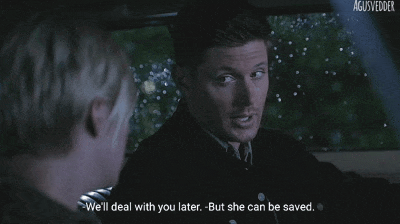
DEAN: [blunt, but in despair] No. Tasha's in too deep. You don't ever come back from that, not ever.
How disturbingly painful it must be for Sam knowing his brother is losing faith in winning his battle against the mark.
There’s another interesting dialogue, now between the two sisters, where we can dissect the foreshadowing of Sam trying to get through to Dean in the last episode of this season.
KATE [pleading] T., I can help you get better.
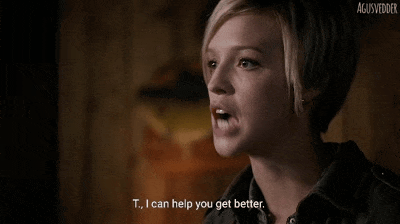
TASHA [sneering evilly] Oh, I am better. And smarter and stronger… and awesome. I'm a freakin' superhero.
KATE Who kills innocent people? No, that's not you. You were a good kid.
So, Sam will try to save the innocent and good side of his brother, with all his power.
Because even if Dean perceives himself as a monster that can't be saved, Sam will always try to convince him otherwise. Just like Castiel…
You are a role model
Episode 10x09 ‘The Things We Left Behind’ is a beautiful episode that talks about GUILT. Not just Dean's guilt (we all know about that one, right?) But also Castiel's GUILT and his REGRETS.
Castiel visits Claire Novak, because he knows he hurt her a lot by possessing her father. So he tries to help her. But, because his PEOPLE TALKING SKILLS are ‘rusty’, he’s not able to communicate it the right way. So he helps her to escape instead.
In the middle of this episode we have this cute scene:
Dean watching TV, reflecting that innocent side I was talking about first, and Sam staring at him with sadness in his eyes, being worried about the mark. This situation points out their priorities.
Back to Castiel and Claire. There’s a very meaningful scene in which Cas talks about his experience as a human and what he has learned in that time…
CLAIRE: You’ve changed. The Castiel I met? He was crappy. Like super stuck-up and a dick and you just wanted to punch him in his stupid angel face.
CASTIEL: I don’t think I was THAT bad.
CLAIRE: You totally were. And now you’re just … I don’t know. Nicer. And kind of a doof. No offense.
CASTIEL: Yes, well, um… Before, I was very self-assured. I was convinced I was on this righteous path. Now I realize that there is no righteous path. It’s just people trying to do their best in a world where it’s far too easy to do your worst.
This is amazing because Castiel is shouting out the important insights he has gained from being a human. This is character development at it’s best. Cas is not the same Castiel that possessed Claire's dad. She says he is nicer. Castiel has changed, for good. But the guilt of taking her family away from this girl is eating him up inside.
And it’s the same thing that eats Dean up inside as well.
Dean sees an opportunity to stay alone with Castiel on kind of a date with him. Both of them sitting in front of their burgers. We know Cas doesn't have to eat. So the scene is very cute and comfy.
The question whether or not ketchup is a vegetable and Dean answering Hell yes is demonstrating that Claire and the hunter are very alike.
This date is also a chance to put back the dot on the I again. Because… remember Cas and his ‘female in the car’? Well… our hunter needed to reinforce his ownership over the angel.
But mostly… the guilt needs to be put on the table:
DEAN: (...) All right, so spill. What’s with the family reunion?
CASTIEL: I don’t know. I’ve just been … thinking about people.
[Dean glances around, then switches their plates, taking Cas’ burger and setting his empty plate in front of Cas.]
Okay, pause here, sorry but this is extremely cute… and Dean looking around like an innocent kid, it’s such a beautiful scene that I adore.
CASTIEL: No problem. I’ve helped some, but I’ve … I’ve hurt some.
DEAN: So you’re having a midlife crisis.
CASTIEL: Well, I’m extremely old. I think I’m entitled.
It’s so amazing each time Castiel reminds us he is an ancient creature that decided to spend his days with us…
DEAN: Cas, listen to me. There’s some stuff you just got to let go. Okay? The people you let down, the ones you can’t save … You got to forget about them. For your own good.
CASTIEL: Is that what you do?
Okay, here Dean is sensing Cas is feeling guilty, a territory he knows very well, so he tries to help him and give him advice, an advice Dean doesn't follow himself. And Castiel knows that too well. Because he can read Dean Winchester like a book. And we all know he won't let go Charlie's death.
And then… this jewel…
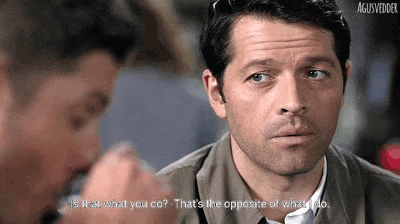
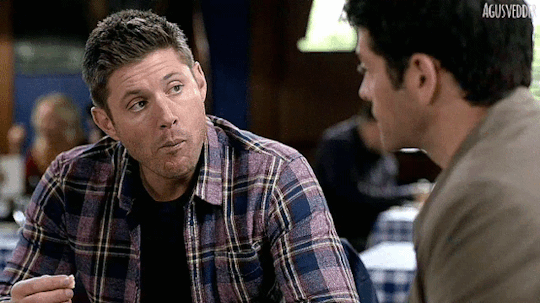
Dean is not used to receiving compliments. But Castiel is always calling him nice things. Because Cas sees the good in him, he knows DEAN IS SPECIAL. So Dean, Cas’ TFW teacher, is a role model for him. Of course he is.
Look at Dean's flustered face, he has to avoid Castiel's tender gaze because he is feeling awkward. It looks like a don't say things like that to me on our date, bro- face.
One of my fave scenes ever.
Let's go with another one…
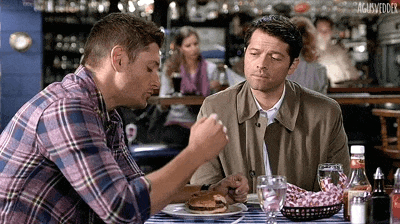
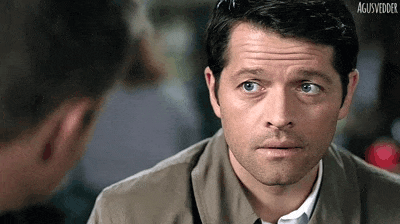
As I said, Castiel reads Dean like a book. So he knows when Dean is lying. He just knows Dean is not feeling well. And again, Dean is… enraptured by this. By how well Cas knows him. Look at his face… if I was telepath, which I'm not (yet) I would say, Dean ponders whether kissing him or not in that moment. It’s like… stop flirting with me or I will kiss you, bro. He even checks out Cas and stares at his lips. Gah!
Then, coming back to reality… Dean needs to know if Cas will kill him bc he is terrified of becoming a monster again:
DEAN: If I do go dark side, you got to take me out.
CASTIEL: What do you mean?
DEAN: Knife me. Smite me. Throw me into the freakin’ sun, whatever. And don’t let Sam get in the way, because he’ll try. I can’t go down that road again, man. I can’t be that thing again.
Dean is asking something impossible for Cas to do. As we will find out in one of the last episodes from this season. Castiel would never hurt Dean, even if he goes dark side.
Two Faces
After Dean is losing control, turning into the monster he was so afraid of becoming, killing Randy and those gangsters… nothing will be the same anymore. This bloody scene is a premonition of the end of this season, when Dean will eliminate the whole Stein family.
Episode 10x10 starts with this image:
Cracks in the mirror which are reflecting how Dean is feeling inside: broken.
This is an episode where light and shadow play a big role in the visual narrative, we can see Dean's face divide in one half lit and the other half drowned in shadows. Those halfs represent his two faces, his inner fight between ‘our’ Dean and the monster brought by the mark.
This episode was directed by Misha, so when we see Cas telling Dean he’ll be sending emojis… that wasn't OOC, that was just Misha 🤣🤣🤣🤣.
Now, the important part of this episode is Claire trying to convince Dean to come by saying: ‘Castiel seemed to trust you, a lot’.
That was the signal for Dean. You drop Cas’ name, count Dean in!
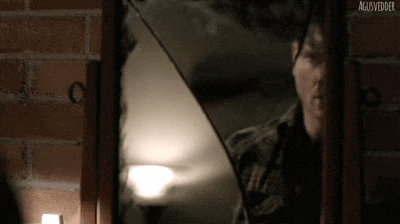
But now let's jump to episode 10x11 because the game of the two faces is represented here again in the form of two Charlies, a good and an evil one. They are a metaphor for the way Dean feels inside, in fact the whole episode is a mirror of it.
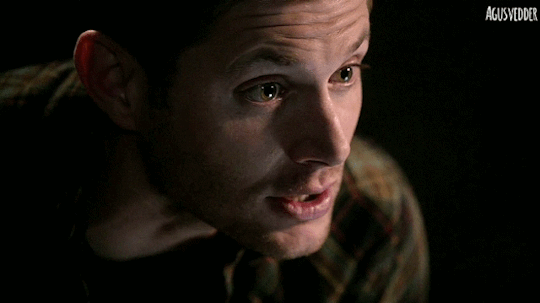
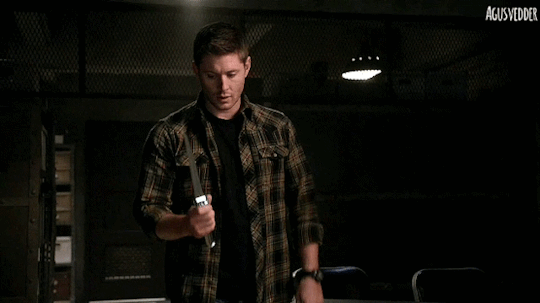
The parallel between Dark!Charlie and Dean is blatant, because Dark!Charlie is seeking for revenge, just like Dean will after Charlie's death.
Charlie had to release her darkness to win a war, the same thing will happen to Dean. In order to win the war against a whole family (Stein) he will have to release the monster inside of him. At the end of the episode Dean and Dark!Charlie are having a fight, a fight between good friends as a foreshadowing of the Destiel fight in episode 10x22.
To conclude:
The monster inside Dean is on the threshold of being released. The episodes we were talking about showed us a lot of examples, mirrors of and parallels to that.
The symbolisms of two faces and broken mirrors were very interesting.
The synergy of light and darkness is also a foreshadowing for the next season with the appearance of God (light) and Amara (darkness).
The Destiel burger date was too cute, and Dean not knowing how to react to Castiel's compliments was even cuter. To Cas Dean will always be special and a role model, that's why he will be incapable of harming Dean in any way.
Hope you like this chronicle, see you in the next one!
Tagging @metafest @magnificent-winged-beast @emblue-sparks @weirddorkylittlediana @michyribeiro @whyjm @legendary-destiel @a-bit-of-influence @thatwitchydestielfan @misha-moose-dean-burger-lover @lykanyouko @evvvissticante @savannadarkbaby @dea-stiel @poorreputation @bre95611 @thewolfathedoor @charlottemanchmal @neii3n @deathswaywardson @followyourenergy @dean-is-bi-till-i-die @hekatelilith-blog @avidbkwrm @anarchiana @dickpuncher365 @vampyrosa @foxyroxe-art @authorsararayne @anonymoustitans @mybonsai1976 @love-neve-dies @wildligia @dustythewind @wayward-winchester67 @angelwithashotgunandtrenchcoat @trashblackrainbow @deeutdutdutdoh @destiel-is--endgame @destiel-shipper-11 @larrem88 @charmedbycastiel @ran-savant @little-crazy-misha-minion @samoosetheshipper
@shadows-and-padlocked-hearts @mishtho @dancingtuesdaymorning @nerditoutwithbooks @mikennacac73 @justmeand-myinsight @idontwantpeopletoknowmyname @tenshilover20 @teddybeardoctor @pepevons @helevetica @isthisdestiel @dizzypinwheel @jawnlockwinchester @horsez2 @qanelyytha @imjustkipping
If you want to be added or removed from this list just let me know.
If you want to read the previous metas From season 10, these are the links...
LI, LII, LIII and LIV
Buenos Aires March 31 2020 10:03 PM
122 notes
·
View notes
Text
Psycho Analysis New Year’s Special: Roy Batty
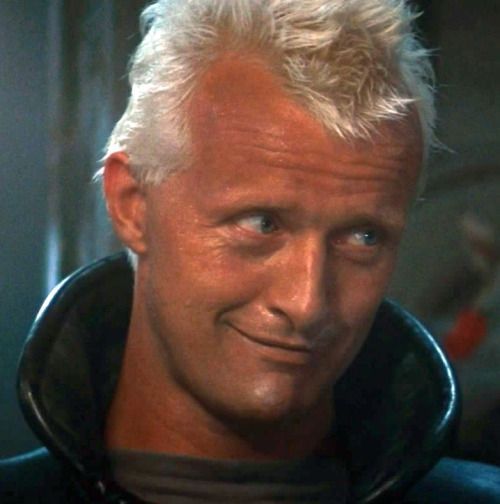
(WARNING! This analysis contains SPOILERS!)
There are villains, and there are anti-villains, villains who do evil but who evoke sympathy because while their actions are heinous, their motivations are sympathetic and understandable. And there are few villains in all of cinema and even fewer anti-villains who evoke quite as much sympathy as Roy Batty.
Roy Batty is a Replicant, designed for combat and made to basically be a slave as all Replicants are. And despite all this, Batty merely wants to be free and live his life, and in fact prolong his life as he does not have a lot of time left – Replicants like him only get a few years at most. And so he murders and tortures his way through people who might have the answers he seeks, and yet, despite all this Roy Batty never once stops being sympathetic, he never stops being someone the audience can somewhat empathize with. We condemn his actions, sure, but he always remains a tragic figure.
Despite being ostensibly the villain of the film, Batty manages to have a defined arc that gets just as much attention as Deckard, fully fleshing him out and making him something of a villain protagonist from a certain point of view. In fact, Batty is not just a great villain and a great protagonist – he’s probably one of the greatest characters in all of cinema.
Actor: Phillip K. Dick, author of Do Androids Dream of Electric Sheep?, the book Blade Runner is based on, is quoted as saying Rutger Hauer was "the perfect Batty — cold, Aryan, flawless." Batty was designed to be the perfect being, a flawless specimen of man, strong, smart, and driven, and if any man in the 80s exemplified that, it was Hauer. In a career of great performances, this was Hauer’s finest, and most of that comes from him inspiring so much of what we love about eh character, doing little things that wre thrown in because he felt it made Batty more interesting. Of course, the most important thing Hauer did was change Batty’s scripted dying words into something far more poignant and beautiful, but we’ll get to that shortly. If it isn’t clear, this is an absolutely perfect performance.
Motivation/Goals: Batty has a simple goal, but a goal that drives him to desperation: he wants to live. And he wants to live because he can’t bear all of his memories being forgotten, washed away by time and forgotten. He wants to be remembered if nothing else, but he goes to murderous lengths to achieve his goal… though frankly it’s seriously hard not to sympathize with him considering that he’s an escaped slave desperate to leave some mark on the world and live free going up against a cop who is legally allowed to hunt him down and terminate him. I suppose it is part of the point that we should sympathize with him; he’s more human than human, after all.
Personality: It’s actually interesting to note that Batty is well-read, intelligent, charming, and philosophical… which is the opposite of our tough, gritty noir detective protagonist Deckard. Much has been made of Harrison Ford’s, let’s say, “understated” performance in Blade Runner, but frankly I find it to be a deliberate choice to contrast against Batty: we have a machine that is all too human going up against a human who is bland and robotic. It ties in very well thematically with the film.
Final Fate: After spending the climax beating up Deckard and basically going bonkers after the deaths of his lover and friends, Batty regains his composure, saves Deckard’s life, and, well...
Best Scene: ...he dies. But not before he laments on how all the amazing experiences he has had in his short, tragic existence will die with him and end up forgotten. This is one of the most beautiful soliloquies ever put to film, and while I’m not the biggest fan of the film as a whole, I am an enormous fan of Batty and this scene in particular. I tear up every single time I watch this; Hauer’s performance here is so powerful.
Best Quote: As if it could be anything else aside from the “Tears in the Rain” soliloquy: “I've...seen things you people wouldn't believe. Attack ships on fire off the shoulder of Orion. I watched C-beams glitter in the dark near the Tannhäuser Gate. All those... moments... will be lost in time, like tears... in... rain. Time... to die...” This quote becomes all the more tragic and poignant as Hauer passed away in 2019, a few months before the month his character died in the 2019 this movie envisioned. It’s a sad, eerie coincidence that only serves to empower these lines even more.
Final Thoughts & Score: Roy Batty is one of the most beautiful and poignant characters in all of cinema. Everything about him is just so appealing on a character level, and it amazes me because he’s really the only part of the movie I love. The rest of it has just never vibed with me even a little bit – but Roy Batty? His struggles are always relatable.
While obviously it’s not likely you’ll know what it’s like to be a slave, it’s pretty common to have that sort of existential dread that Batty has. I know I’ve always feared dying alone and unremembered, all of what I am being forgotten as I fade away. Maybe that’s why Batty resonated with me more than the rest of the film and certainly more than Deckard: you can give me all the gritty cyberpunk noir with Harrison Ford you’d like, but it won’t mean anything if you’re giving me a deeply existential and philosophical cyborg superman desperate to either extend his life which is rapidly burning out or at least somehow preserve his memory so that his existence is not utterly forgotten (this last bit actually makes his casting as the replacement for Master Xehanort all the better; The Nobodies had similar themes, what with their Proof of Existence graveyard and desire to have their hearts returned).
Adding into what makes him so engaging to me is the religious symbolism, something I’m a sucker for. Batty ends up as a strange and complex fusion of both Lucifer and Jesus, descending from the sky to free his people in spite of the wishes of his god-like father. He does resemble many stereotypical depictions of Lucifer, as well. But then we get to the more Jesus-y bits, such as his affinity for doves and the fact he dies with nails through his palms and a dove in his hands. He’s such an interesting Messianic archetype.
Batty is clearly a 10/10. That 10 is pretty much solely for the soliloquy too; if only I had more of an excuse to give him an 11, but sadly Batty hasn’t had the massive impact on popular culture that he deserves, which is a shame. Batty is still a perfect villain regardless, and a perfect character to boot, no bones about it. In the end, while he never succeeded to extend his life, he did end up getting what he wanted on a meta level: Roy Batty, to all who have seen the film, is eternally remembered. His memories are not lost to time like tears in the rain; those memories live on in us. If Batty were real, I hope he would be satisfied that his short life was not in vain.
I think it says a lot that he doesn’t appear in Blade Runner 2049, and yet... as the film ends and K lies dying, Vangelis’ “Tears in the Rain” plays over him, drawing a direct connection between the dignified, tragic end of Roy Batty and the heroic sacrifice K made to save Deckard and ensure he could finally meet his daughter. Roy doesn’t need to appear at all; just invoking him in spirit is enough to make a scene all the more beautiful and poignant. If that is not the sign of a great character, I’m not exactly sure what is.
29 notes
·
View notes
Text
Throwback Thursday: Holy (Anime) Week!

On Beneath the Tangles, we celebrate two Christian holidays with special fervor: Easter and Christmas. As we take a look back at the ten years of this ministry, and with Easter 2020 fast approaching, it felt like an excellent time to throw back to Holy Weeks past and the topics we discussed each year.
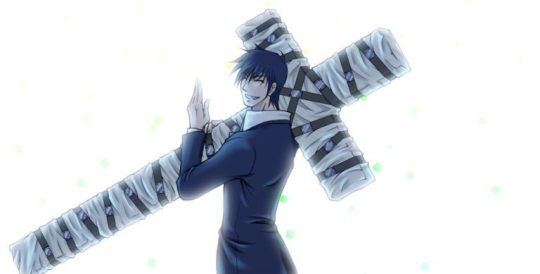
illustration by ゆきやなぎ (reprinted with permission)
2011: Nicholas D. Wolfwood
Is there any figure in all anime that comes more immediately to mind when thinking “Christian” than Nicholas D. Wolfwood? A man of violence and an anti-hero, he’s no saint, and yet that’s what makes him so worthy of discussion and love. His growth throughout Trigun and especially those scenes in the anime are worth analyzing again and again and again, both from a broader perspective and a personal one. If Vash the Stampede is the hero we want to be, Nicholas D. Wolfwood is the man we are.
Nothing Like God: Redeeming Nicholas D. Wolfwood
Spirituality in the Anime Blogosphere: The Gospel According to Wolfwood
While I Was Yet Lost: Wolfwood Meets Grace
The Faith of Yasuhiro Nightow
Spirituality in the Anime Blogosphere: Violence, Grace and Redemption in Trigun
The Invisible God…in Trigun
2012: Loving You for Who You Are
We went topical in 2012 and did something quite fun as we compared specific anime relationships (not all romantic) to how Christ loves us. This is how I explained it:
While Christianity is often called a judgmental religion (probably because of its adherents more than any other reason), Jesus came and showed us that He loves us for who we are. No matter what we’ve done or how we’ve been broken, He offers a warm love that says, “I know who you really are and I still love you.” Some of the great relationships in anime, romantic and friendly, demonstrate a similar love.
Araragi and Senjougahara (Monogatari)
Taeko and Toshio (Only Yesterday)
Arata and Chihaya (Chihayafuru)
Kaji and Misato (Evangelion)
Daikichi and Rin (Usagi Drop)
Naruto and Sasuke (Naruto)
Conclusion
2013: Madoka and Anime Jesus
We didn’t do a week full of posts in 2013, but material presented itself nonetheless in the form of magical girls and a short anime film about Christ, which we post on Easter Sunday almost every year.
Magical Girls and Good Friday
An Easter Invitation

illustration by よねゆ (reprinted w/permission)
2014: Noragami
Even before the second season of Noragami came out—which was packed full of rich material to dive into—we found enough in season one of the show to spend a whole week focusing on it. The world of gods in Japan—those of calamity, war, and all sorts of other things—were also unexpectedly able to provide ample material from which we could talk about the one true God.
Noragami and Treating God as a Genie, Part 1
Noragami and Treating God as a Genie, Part 2
The Book of Hiyori
Yukine and Matters of the Heart
Noragami and a Saving Grace
Patient Yato, Patient Yahweh
Yukine’s Sin and Comprehending Holiness
2015: Key Anime
You know, I admit I’d forgotten we did this series of posts because in each of the last few years, I’ve thought to myself, “We really should do a Holy Week on Key anime!” Well, we did so that. So many emotional, heartfelt, and fantastical series have come from Key—it’s no surprise, then, that we could discuss them for two full weeks’ worth of posts, at least! And who knows? We may revisit this topic again in the future…
Key Anime and Easter
Air: New in Light of the Old
Dive into the World of Rewrite
Rewrite Part 2: The Moon of Possibilities
Angel Beats and Easter
Rewrite Part 3: Terra, the Path of Salvation
Revisiting Clannad and Fathers
Rewrite Part 4: The Meaning of Salvation
Rewrite’s Biblical Meta-Narrative
Kanon: Rising to Life
2016: Christ Figures in Anime
If you look at Christian analysis of anime as a series of levels drilling deeper and more meaningful the further you get, the most surface level is that of comparing some character to Christ (i.e. Goku is Anime Jesus). If we stick with just basic analysis such as that, we might miss the opportunity to really learn and grow in our relationships with God through such examination. But if done correctly, comparing Jesus to anime characters can help you remember what you love about the Savior—and that’s exactly what the staff did in 2016.
L Lawliet as a Christ Figure (Death Note)
Princess Tutu as a Christ Figure (Princess Tutu)
Brandon Heat as a Christ Figure (Gungrave)
Utsugi Lenka as a Christ Figure (God Eater)
Kaname Madoka as a Christ Figure (Madoka Magica)
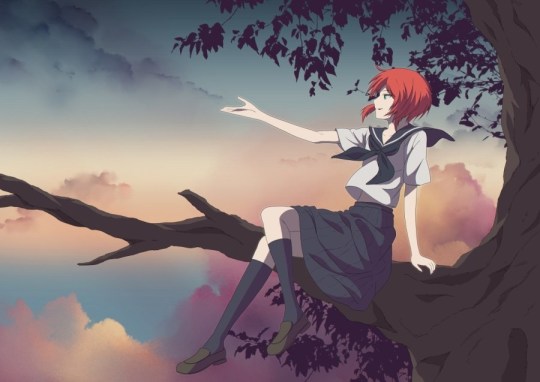
art by jaokuma (reprinted w/permission)
2018: The Ancient Magus Bride
After skipping 2017, we focused again on one particular anime in 2018, The Ancient Magus Bride. A particularly meditative and sensitive look at pain, depression, and violence, it was ripe for analysis by staff during Holy Week, and is much beloved by our followers as well, judging by its success this year in Anime March Madness!
The Patient Magus Bride
The Grace Chase of Joseph and Cartaphilus, Part I
The Grace Chase of Joseph and Cartaphilus, Part II
The Love of Chise, the Goodness of God
We also skipped 2019, but did do an Easter Sunday post: Trigun and Easter: Always Never Alone. We are not skipping this year, however! Although more details will be coming on April 5th, I’ll announce 2020’s theme now: Anime and Disability. I’m really happy that we’re covering this topic; we’ve been making a concerted effort to especially reach those in the otaku community who live with disabilities. I’m bringing in a couple of wonderful guest writers in addition to the regular content our staff will be developing. I hope you’ll enjoy the series as we build toward the most important day of the year for Christians, and I hope that the posts will both bring some insight to you that you may not have had before and help you prepare for the holiest of days!
7 notes
·
View notes
Note
Very nicely written meta! I really enjoyed your analysis! So question, a lot of people like to see how Qrow handled his bird form. What does your Qrow think of it? Are there any tics he has picked up from going back and forth between man and bird? ( like collecting trinkets or the like? )
inside the birdbrain ** always accepting!
╾╾╾╾╾╾╾╾╾╾╾╾╾╾
Thank you!! ;A; And double thanks for taking the time to stop by with a question! I hope it’s a satisfactory enough answer.

To the first question,
He thinks of it, mostly, as a tool. Granted, a meaningful one - it’s special to him and Raven alone which is pretty cool; it’s a symbol of Ozpin’s trust; it’s also kind of a reward for being one of the best so he can take pride in that. It’s a secret which can feel like a powerful little ace up his sleeve, even if it’s not really relevant at the time; like a confidence booster if he’s intimidated by other “regular” humans.
As a man with a frequent need to escape his own mind, he loves the freedom his bird form offers, flying through the air unburdened, dipping and weaving in full control of himself, getting to see the whole world in all its beauty and darkness, learning secrets and being able to watch over people. but he respects the responsibility also tied to it, and thus rarely indulges or risks giving himself away without a purpose.
I guess you could say he considers it a blessing that evens out his curse, just a little bit.
To the second,
I probably don’t play up the bird type tics as much as some other people do, but I do like the idea! It becomes another self that you’re bound to pick some new habits up from just like if you started frequenting a new place or new people, after all. (I really really love the bird-like head twitching they gave Raven in vol 4, but haven’t seen any equivalents for Qrow really?)
I haven’t noticed a whole lot in canon to blame on bird-ness, and I’m still waiting on the muse to reveal some things to me otherwise, to be honest. But here’s a little list of things so far:
- an affinity for eating seeds as a snack. particularly sunflower seeds.
- staring longingly out windows, missing the sky and all the information that comes with being out there. you’d be surprised what kind of secrets the changing winds carry. also, he’s kinda always keeping an eye out for Raven.
- he can whistle in birdsong. Yes, I know corvids only make ‘ugly’ sounds. No, I don’t care. It’s a general bird thing. Also magic. Also they can learn to imitate other sounds.
- he’ll make clicking/rattle type noises sometimes when he’s thinking. Probably only if he’s by himself. Granted, it sounds a little different since in human form it’s with his tongue instead of his throat.
- I can’t see him collecting/stealing trinkets, even though I wish I could say that. He’s just not a materialistic person and likes to travel light. Shiny things do catch his eye, but he usually doesn’t do much about it. It might make him consider switching up his rings sometimes. What he will do is pick up and leave little trinkets for other people, he doesn’t ‘give gifts’ exactly, as he doesn’t present them to people. He’ll just discreetly drop them off on a counter, or windowsill, or their bed when they’re not around. It’s not often, but it might become moreso the better he knows someone.
- The one exception to being discreet that he allows himself: If he’s so happy he doesn’t even know what to do with it, or so upset it’s practically a tantrum (both are rare, but) - he will turn crow and hop around like crazy to get the energy out. It’s his version of screaming into a pillow, I guess. This video is 100% to blame for that one.
- he gets some of the really weird positions he puts his legs in, one from them being so long, but also from going back and forth from bow-legged bird legs.
Thanks again for the question! I’ll make a second list if there’s ever more.
#anonymous#* So yeah there's that = answered *#* behind closed doors = ooc *#* gotta look inside / a little introspection = character development *#* hey don't get mad cause i'm right = headcanon *
5 notes
·
View notes
Note
There is a recurrent mirror game between Levi and Mikasa (battle poses, personal story in terms of family loss and personality beyond all that). Do you think this is due to a reason perhaps script or is it just done to support the parallel vets - EMA and the Ackerman clan in general?
Hello anon!
Sorry if I took a while to answer you!
As far as battle poses and other superficial similarities go, I think that they are made in order to underline Mikasa and Levi both being Ackermans and so soldiers far superior than others. Let’s also underline that Levi being an Ackerman is something which is unknown in the beginning, so emphasizing his similarities with Mikasa was used as foreshadowing. This is why we have Armin mistaking Levi for Mikasa when he appears and later on Armin commenting that soldiers like Levi and Mikasa could defeat even a shifter. These little things were put there to highlight the fact the two of them were linked somehow and that their strength was something odd which would have been explained later on.
However, I do think Levi and Mikasa have interesting parallelisms which are important for their characters and I would also say Eren has some parallelisms with the two of them as well.
First of all, the parallelisms I am gonna talk about are relevant up until the serum bowl meaning that I am not sure they are still present in the current arc and I will need to wait to see how these three characters’ arcs turn out before I can analyse the way they foil each other in a way which is true to the story. Because of this, this analysis will mostly concentrate on the events up to the Return to Shiganshina arc.
First of all, it is interesting that the three characters are the protagonists of the serum bowl in the sense that they are the characters who get into a fight over who should receive the serum. Moreover they all arrive to a different conclusion for different reasons.
Eren and Levi are motivated by personal feelings. However, in the end Levi’s personal feelings lead him to change his stance and to let Erwin go.
Letting the person she loves go is the choice Mikasa makes in the end. However, in her case it has to do with her accepting Hange’s argument about the necessity of losing people for the greater cause. In short, Mikasa overcomes her personal feelings and accepts to sacrifice a person she loves for the sake of their battle.
In short, you can see that the three characters approach the problem in similar and yet different ways and these similarities and differences can be used to highlight something more about all three of them.
First of all, Levi and Eren are presented to have a somehow common mentality in the beginning in the sense that they are determined to kill the titans and to free their people from the walls. I have already written about it here and probably in some other posts, so I won’t repeat it. The point is simply that Eren admires Levi and wants to become like him, whereas Levi appreciates Eren’s determination in pursuing his objectives and him being ready to kill the titans. They both are convinced that titans are evil and that they should exterminate all of them.
However, this vision of the world is challenged in the Clash of the Titans arc. In that arc it is discovered that titans are humans and that two members of the 104th are titan shifters. These discoveries are shown to greatly disturb Eren and Levi because they go in the way of the line they draw in their minds between titans and humans. Eren has to accept that the friends he grew fond of and the people who destroyed his house are the same and Levi has to accept that all the titans he has been killing were people.
During the Uprising, they are both paralleled with Historia (see here for Levi and Historia’s parallelism). I am not sure they are paralleled also with each other in such a clear way and, as for now, I can’t see it. However, it is true that both keep developing in that arc through them facing a father figure. Levi faces Kenny and Eren faces the truth behind Grisha.
Because of this truth, Eren has to accept that he is not “special” as he thought he was and this is something which leads to a breakdown on his part. He is able to overcome it thanks to what Historia says here:

In a world where right and wrong are getting mixed in Eren’s head and are not so easy to distinguish anymore Historia offers him a perspective which is rooted in people and which helps him. Levi doesn’t have a breakdown like Eren has, but I think he too has to face a world which is changing and benchmarks which are collapsing.
Quoting from the meta I linked above:
Kenny himself realizes while dying that he has been a slave to his own strength and to his obsession for power:
He also asks Levi what is enslaving him:
“What are you? A hero?!”
Among all the things Levi could use his strength for he chooses to join a group of dreamers who are willing to sacrifice their lives in order to save humanity and he also takes up the nickname of “humanity strongest soldier”. He becomes “Captain Levi” like the title of the chapter called after him (let’s note that Levi is the only case where the grade is used in a chapter titled after a character).
In short, Levi uses his strength in order to become a hero as Kenny puts it and it is interesting how this choice is perfectly coherent with the evolution of a child who wants to be praised by his parent because of his strength. If Historia tries to be loved by playing the role her father gave her, Levi tries to make himself accepted by society through his strength like Kenny taught him.
Levi has been given an incredible strength and he tried to use his strength to protect the people he cares for and to help others. However, the revelations about the world make things more complicated. In such a situation Levi becomes more and more motivated by people.
For example, when Erwin reveals to him that his dream is more important than humanity for him he still chooses to follow him and in this way it already appears clear that Levi, just like Eren, is a person whose motivations lie mostly in his loved ones.
In short, when it comes to Eren and Levi they start as people that, at least superficially, are motivated by the convinction that the titans as their enemies must be eliminated, but start being challenged more and more showing in this way how they are deeply motivated by their loved ones. Because of this, it is interesting that both of them approach the serum bowl motivated by the love they feel for a person. However, they feelings of love lead them on making opposite choices. As a matter of fact Eren wants Armin to survive no matter what, whereas Levi chooses to let Erwin go.
Letting loved ones go and learning to live without them is a central part of Mikasa’s arc as I explained here.
The root of Mikasa’s character is that she is a child who lost her family and who is terrified from the prospective of losing it again and to remain alone.
(...)
However, the narrative keeps challenging her on this aspect to the point that I wouldn’t be surprised if, by rereading Mikasa’s arc at the end of the series, it would turn out that the whole story was preparing her to say goodbye to Eren (and possibly to Armin):
After all Mikasa has been now tricked twice into thinking that she was losing a member of the costitutive group representative of her happy childhood. To me these two occurrences seemed rehearsals to what will be Mikasa’s final trial. Moreover, she is even told that both Armin and Eren won’t live long.
It’s as if the narrative is warning her that she has to move on and to become more independent because one’s life isn’t reduced to the family nucleus one is born in, but a person can forge new relationships and find warmth and happiness even outside it.
In short Mikasa’s story starts with her being totally unable to face a traumatic loss and it is possible that it will end with her having become strong enough to actually let go. It would be a beautiful way to end her arc imo because it would tie it back to her original trauma (her family being killed) and would solve it together with her relationship with Eren who firstly taught her that she could keep on living even without her loved ones.
Levi’s arc deals with grief as well. As I stated above Mikasa keeps being tricked by the narrative into thinking she is about to lose either Eren (in Trost) or Armin (in Shiganshina), whereas Levi has basically lost a person important to him in all the major arcs he has played a major role. In the Female Titan arc he lost his squad, in the Uprising he lost Kenny and finally he lost both the recruits and especially Erwin in Shiganshina. Even in the current arc we are shown that Levi is still struggling with grief and his motivations lie in his wish to honour the deads.
In short, both characters must learn to deal with loss, but (at least up until The Return to Shiganshina) their growth happens in different ways. Mikasa must struggle to become more independent from Eren. This is why we see her becoming more trusting of her comrades and starting to embrace the SC ideals more than she did in the beginning. Levi becomes instead slightly more open with his new squad and shows more vulnerability to them like the end of the Uprising arc shows. The serum bowl shows this different change very clearly. Both Mikasa and Levi chooses to let respectively Armin and Erwin die, but they do so for opposite reasons. mikasa sacrifices her feelings for Armin, whereas Levi acts on his feelings for Erwin.
Another interesting parallelism is the one Mikasa, Eren and Levi have in the Female Titan arc. As a matter of fact in that arc all three characters end up giving in to their rage towards the Female Titan. Levi does so by threathening her and this is among the reasons why Annie cooses to make a dangerous gamble and escapes. Eren attacks Annie instead of running after Levi squad has been killed and this leads to him being captured. Finally, Mikasa attacks Annie out of rage and would have died if Levi had not saved her.
In that situation Levi makes an interesting remark:
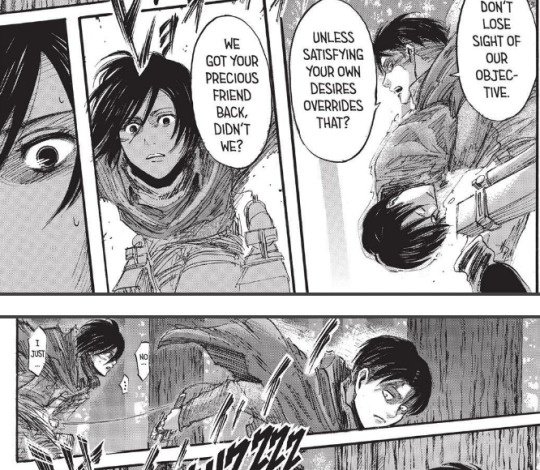
He underlines that there is a difference between killing an enemy and protecting a friend. In the world of snk these two things often end up overlapping. For example, Eren saved Mikasa by killing her kidnappers and Mikasa herselfwants to protect Eren by cutting down his enemies. However, as the story goes on as it is made clear these two things are not always the same.
Levi’s character could actually be the embodyment of this since he has killed more enemies than anyone else, but has still lost countless people he could not protect.
I am underlining this because it is interesting to consider when it comes to Mikasa and Eren’s behaviours.
Mikasa and Eren are foils in the sense that both have been traumatized by the death of their mothers. They reacted to this loss in a violent way, but they directed this violence in different directions. Mikasa wants to use her strength to protect his new family, while Eren wants to kill his mother’s enemies.
Again, these two approaches make so that the two characters have initially similar behaviours, but I wonder if as the series approaches its conclusion a difference will be highighted between these two ideas:
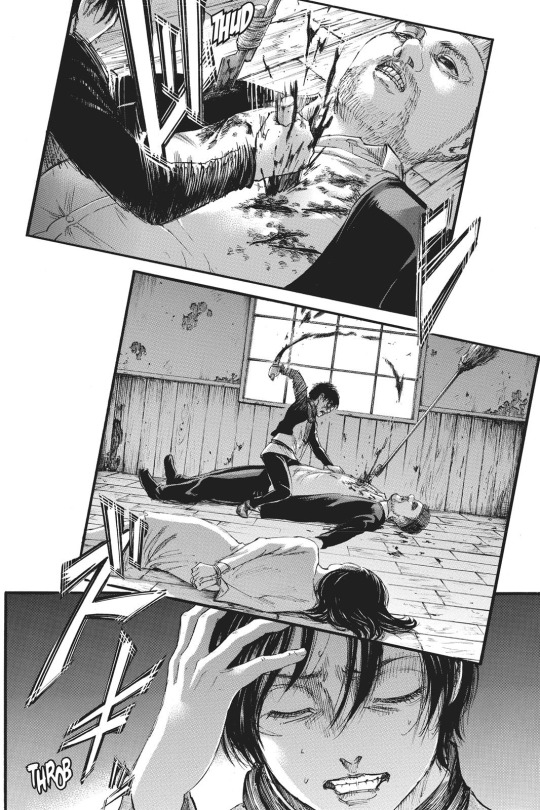
Here Mikasa remembers when Eren saved her, but differently from before she is disturbed by the violence of the scene. Similarly, it is possible that Eren wants to protect his friends, but he is going at it in this way apparently:

Of course this last point is very up in the air because we don’t know what Eren’s motivations and plans are (it’s also important to say that Eren is not motivated by vengeance anymore), but at least it is interesting to think about it.
Take this whole analyses with a grain of salt since currently we don’t know what will happen to Levi and Eren’s interiority is a mystery for us.
Thank you for the ask!
29 notes
·
View notes
Text
Hans’ possible Redemption Arc PART 1: Deconstructing Hans' character
Hey, guys! So this is my first post analysis, meta, observation, whatever you wanna call it, so if it’s seems incomplete or lacks of depth please add your opinions as well! Also English is not my first language but argentine Spanish, papá, so don’t judge me plz. I don’t want to encounter with any anti or hater, and if you have the necessity to speak your mind anyways, do it but in a cordial way.
I’m going to divide this post in 3 parts I think, since is very long, and I have a lot to say for my favorite Jerk redhead Prince 😆
Ok, let’s start, shall we?
_________________________________________
1) Is he really a sociopath?
You know, this is something that upsets me quite a bit. The fact that you can just say “Oh well, he’s a sociopath so he’s manipulative and lacks of empathy” is something that annoys me a little, or at the very least, disappoints me. TBH, you don’t need to be a sociopath (a psychological and mental condition) to be manipulative, apathetic or cruel. I’m trying not to rationalize his actions in Frozen, because he still was wrong by harming two innocent women, but by saying that he’s a sociopath it makes his character a little more… shallow? Simpler? My point is, that a shitty toxic person can be anyone, and it simplifies the complexity that they brought on the table on the first place.
But the questions still remains, is he truly a sociopath?
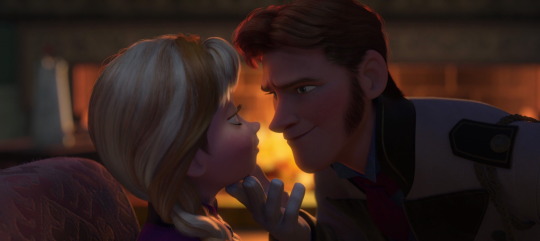
Is tricky, since we know nothing except that his family is shit, and that he is a chameleon, a mirror to other people. By the end of the movie, and by the interviews that Jennifer Lee gave to us, it seems to me that he does have sociopathic traits, but he is not a sociopath per se. Hans can be a sociopath, as much as he could be not, if it’s given a proper character in-depth and backstory.
I think that by calling Hans a sociopath is an easy way to make the GA and the Frozen Fandom to disconnect with him since statistically we have normal-functioning brain, and because people with ASPD diagnose have a negative -though justified most of the time- stigma surrounding them.
2) Grey Morality: The line between good and bad, where we all fall.
“All it takes is one bad day to reduce the sanest man alive to lunacy. That's how far the world is from where I am. Just one bad day.”
― Alan Moore, Batman: The Killing Joke.
As I said before, I like the idea of a morally questionable prince. A more grounded, realistic, game of throne-like character as Hans is. What I don’t like, is the seemingly automatic white to black view that we have for Hans, while at the same time, we have one of our protagonist letting almost die a whole kingdom, and her sister, to escape her duties and crippling fears –unintentionally, but still-. An empath or normal person can commit crime or bad things given in extremes situations of distress, anger, etc. And we see that with our own eyes in Elsa. She almost gets tempted to kill two men, you can see the fury in her eyes, in her face.
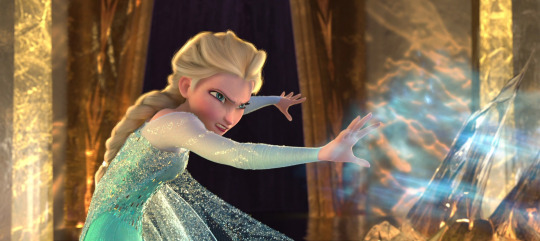
It is self defense, yes. But regardless of that, her people knew nothing about her powers and they just knew that she cursed them and ran away. No matter how morally wrong Hans was by trying to kill Elsa, or letting Anna die, he also helped her. He helped them both.
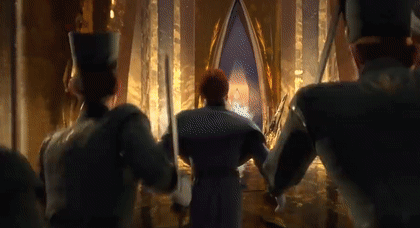
If she indeed killed those men here, I don’t think anyone whould’ve ever trusted her. Not even her own men, whom remember, they witnessed her actions and they were attacked too.
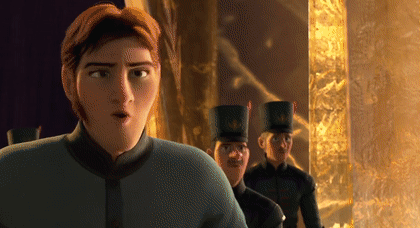
A normal person lies. A normal person manipulates. Heck, we even can choose to not feel empathy if it is inconvenient for ourselves. How many times did you pretend to feel empathy for someone just to make them feel comfortable? How many times did you see a homeless person asking for a money and you just walked away?

Again, I’m not trying to normalize these negative traits, but to be sincere about it. And is something that makes us very complex as human beings, we are true neutrals, and we can be good or bad, depending of the actions taken at certain moments, and how it impacts to others.
Yes, some people are irredeemable monsters, but I don’t think that’s Hans’ case. And so he does have redeemable qualities as well, even if it might be for personal gain, or perhaps some of his actions were genuine, we don’t know for sure.
When did we not see an ambiguous morality in Frozen? Or when did we not see ambiguous morality in some Disney characters, in general? Is hard to find, but we do certainly have our morally wrong characters redeemed. Here are a few:
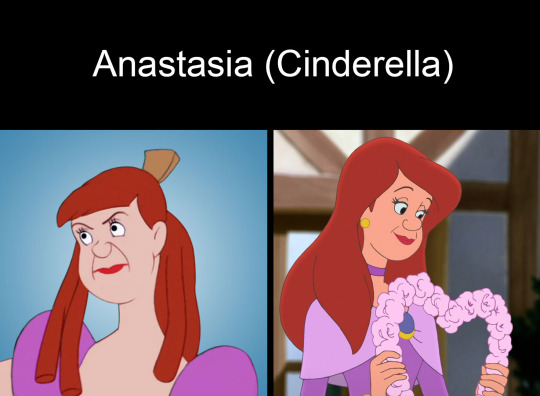
- Abused both physically and psychologically Cinderella.
CURRENT STATE: Redeemed.
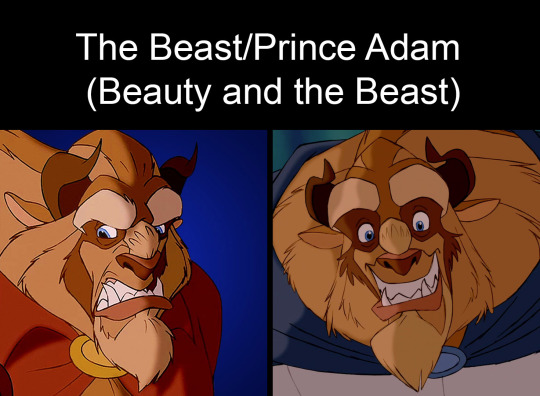
-Imprisoned Belle.
-Verbally violent towards his subjects and Belle.
-Almost harms physically Belle.
CURRENT STATE: Redeemed.
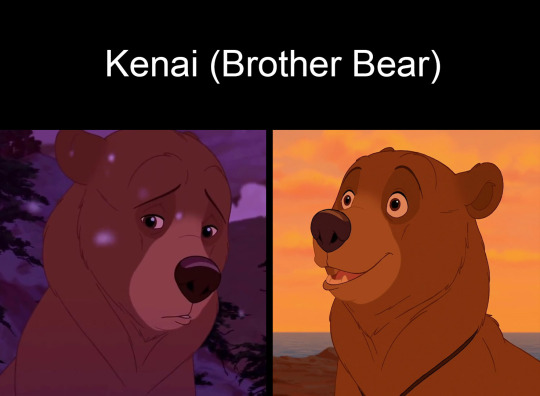
-Killed a bear out of vengeance.
-Let motherless a bear cub, that after he would befriend.
CURRENT STATE: Redeemed.
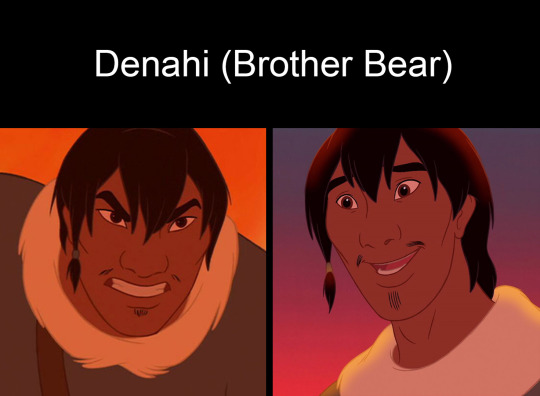
-Almost kill a bear out of vengeance too. On top of that, was his own brother (though he didn’t know).
CURRENT STATE: Redeemed.
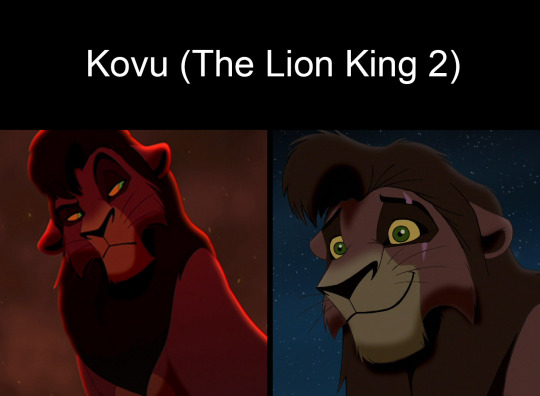
-Tried to kill Simba and take his pride.
-(invoked) Forced mating with Kiara.
-Almost attacks Simba.
CURRENT STATE: Redeemed.
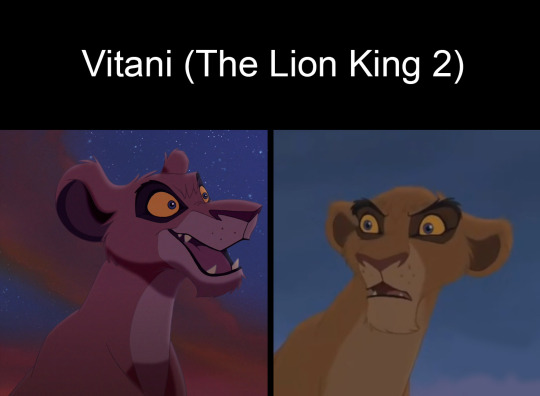
-Tried to kill Simba.
-Attacked the lionesses of his pride.
CURRENT STATE: Redeemed.
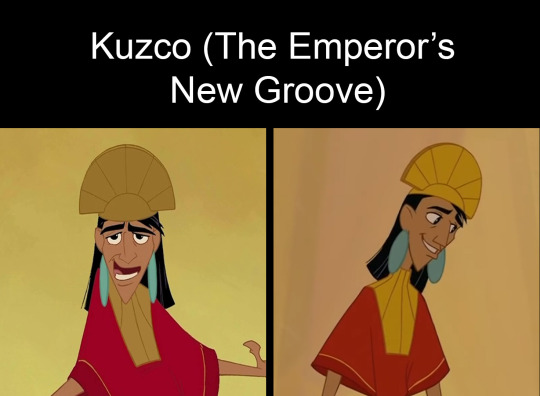
-He was an asshole to everyone.
-He ordered a guard to throw an old man through a window (still lol).
-He tried to let homeless a whole village for his selfish desires.
-He betrayed Pacha’s trust.
-He let Pacha on his own fate (probably to die).
CURRENT STATE: Redeemed.
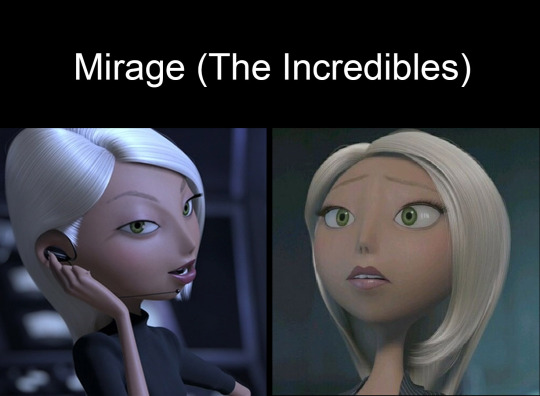
-Along with Syndrome, she plotted the death of many superheros, including Mr. Incredible.
-Almost kill Mr. Incredible.
-She almost kill a whole family, including the children.
CURRENT STATE: Redeemed.
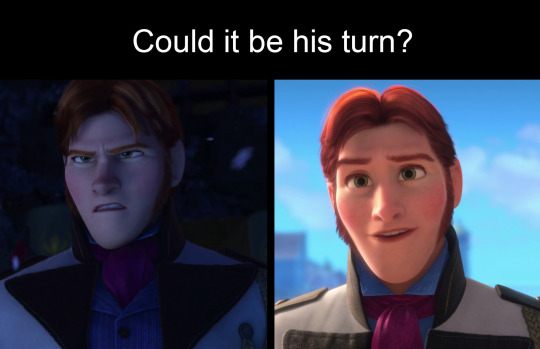
-He tried to kill Elsa, and let Anna die alone for personal gain.
-Deceived Anna, Elsa and everyone else.
-Plotted the death of Elsa at some point in the movie (unclear when exactly).
-Degraded verbaly Anna.
-He tried to break Elsa’s heart to make her give up her life.
Redeemable Qualities:
-He took care of Arendelle while Elsa and Anna were gone (though, it still can be interpreted as gaining popularity).
-He went off to look out for Anna.
-He ordered the Arendelle guards and the Merchant’s not to harm Elsa.
-He calmed Elsa’s rage, avoiding her to kill.
-He tried to reason with her.
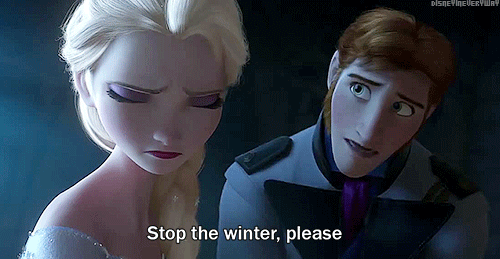
Elsa is shown that suffers of guilt and insecurities, yet throughout the majority of the movie, she still rejects Anna and her responsibilities as Queen. Even to a point where she witnesses hurting Anna with her magic,

yet she just casts her away from her Ice Castle. Or after the misery that she caused -and she’s visibly hurt by that- she’s still thinking of running away, instead of trying to change things. Hans pleaded her to stop the winter and bring back summer, but she said that she couldn’t.
My goal here is not victim-blaming. I’m not blaming Elsa for her insecurities or self-defense actions. But her character at the end of the film, has a lazy realization, and for me, an unsatisfactory conclusion in terms of story-telling, because we never she her develop for herself, or working hard to balance her bad actions throughout the end of the movie, but anyway.
I’m not trying to rationalize morally questionable/wrong actions either. A good action doesn’t cancel the bad one, but my main interest is to analyze the human psyche, character growth and development.
3) Love and Fear: a constant subject in Frozen, and a constant subject for a “Prince”.
So cut through the heart, cold and clear
Strike for love and strike for fear
See the beauty, sharp and sheer
Split the ice apart, and break the frozen heart.
—Disney’s Frozen “Heart”
DID HANS ACT ONLY OUT OF COLD AMBITION, OR HE WAS ALSO AFRAID?
For what we know from A Frozen Heart, interviews and extra information, is that Hans is abused so much by his brothers, that he just accepted their behavior and doesn’t fight back, is something normal for him. Nor he tries to improve his relationship with them. His relationship with his father is also painfully cold and toxic, and their dynamics are comparable to Zuko and Ozai, Tyrion and Tywin, or Theon and Balon. Hans seems to have an inferiority-superiority complex, and so, his pride is fragile and as well (just as previous Zuko, Theon and Tyrion).
But how? He’s very charming, and his body language never shows signals of insecurity (though that’s debatable). Or when he confesses his true intentions to Anna he has a sexy smug smile in his face, and his voice is soft and low, cruel and never trembling. How is that I believe that he was afraid or scared? Well, the movie itself states that he does have a terrible relationship with his brothers, the novelizations extends this to his father.
So by knowing this, a person copes with the pain and abuse in different ways: Elsa’s fear is hurting her loved ones, so she forced herself to an emotional -and literal- isolation towards them, specially with Anna. In Hans’ case, his fears are being trapped forever in his “home”, and being rejected by his father. So his way to acclimatizing himself in such negative environment, is to avoid his true feelings and morality. Avoiding his true identity, in essence. Thus, becoming into the Mirror Hans (more on that later), allowing him to become the very thing that he actively tried to avoid for years.
I think that here’s the point where he started to panic; where the fear of going back to his depressive life, and the taste of power that Anna gave him when she left him in charge, took him over completely, forcing himself to toss apart any bit of true morality and compassion that he had for Anna and Elsa. Where his mind started to realize that executing Elsa was the only way to bring things back to normal.
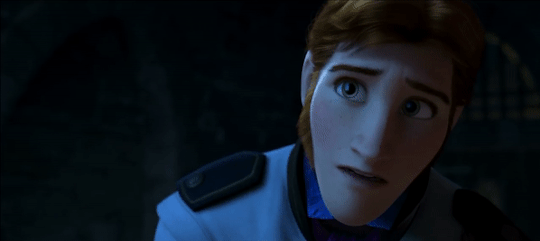
But is also the fact that Anna dissapeared, and Elsa was the only rightful heir to Arendelle, so his conflict was “What do I do? What’s next?” If Hans decided at the moment to execute her, and Anna was dissapeared, he wouldn’t get to be King of Arendelle, and he would back to his hell home. His conflict is both emotional and materialistic, and fear started to get under his skin too. Some might argue that he’s just reflecting Elsa’s emotions, which is valid, but keep in mind his goals, his backstory; try to read him beyond what the movie told you. Link the dots to picture his mind.
Some other might point out this scene.
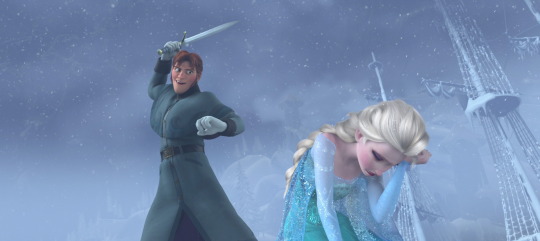
[SIDENOTE: To me, it seems like another atempt to make us dislike him more. In my eyes, is like that the creators tried to manipulate us to hate him, but anyway don’t mind my defensiveness towards him LOL. He’s a terrible person Angie! Stop it, goddamit!]
It interpreted this part as Hans joy of finally seeing the chance of escaping his prisonic home, dehumanizing Elsa completly. WHICH IS BAD regardless. Is he a sadist? The book implies that he takes pleasure in feeling physical pain, but he does not take pleasure on harming others.
So to me, is a smile of almost getting to win a big bad in a videogame, or well... that’s the type of face when I’m about to eat a pizza so, IDK :v 🤷♀️
THE MACHIAVELLIAN KING VS THE MACHIAVELLIAN PRINCE: The Lion and the Fox.
One of the reasons that Hans didn’t fit his family -besides being the smaller and weaker member of them-, is that his morale and philosophy clashed with the imposing, hard power that his father values. Being flexible and benevolent to the common people is a sign of weakness for Hans’ father and brothers. The king sees himself and his other sons as strong and powerful as lions, and he compares Hans to a mouse because he doesn’t fight back, nor shares his value of hard power. The King’s philosophy is kinda like Darwinism with Machiavellian shades. So in one side, we have the cruel side of the Machiavellian philosophy, the one that values fear over love:
“From this arises the question whether it is better to be loved rather than feared, or feared rather than loved. It might perhaps be answered that we should wish to be both: but since love and fear can hardly exist together, if we must choose between them, it is far safer to be feared than loved.”
“One can say this in general of men: they are ungrateful, disloyal, insincere and deceitful, timid of danger and avid of profit...Love is a bond of obligation that these miserable creatures break whenever it suits them to do so; but fear holds them fast by a dread of punishment that never passes.”
But in Hans’ side, he believes (or puts in practice, at least) that appearances and benevolent acts are better way to influence people, to gain more popularity. This is the softer side of power, the more deceitful and diplomatic Machiavellian route:
“Everyone sees what you appear to be, few experience what you really are.”
“Never attempt to win by force what can be won by deception.”
“Therefore it is unnecessary for a prince to have all the good qualities I have enumerated, but it is very necessary to appear to have them. And I shall dare to say this also, that to have them and always to observe them is injurious, and that to appear to have them is useful; to appear merciful, faithful, humane, religious, upright, and to be so, but with a mind so framed that should you require not to be so, you may be able and know how to change to the opposite.”
So we see the two opposing sides of the Machiavellian philosophy, one relies on hard power, and the other in subtle power. In essence, Hans’ father rejects the soft power because of his imposing pride and ego. But both characters share the same Machiavellian influence in their beliefs, the only difference is that Hans takes no joy in being cruel and tyrannical, thus preferring the softer, more subtle side of power.
Yet at the end of the day, he embraces the cruelty, and fails to become the hero he expected to become, and by the time he realizes his mistakes and regains his morality, is too late.
What I’d like to see in Hans’ Redemption Arc, is a discussion between the characters (mainly Hans and Elsa) about this matter. An intellectual battle, and him realizing that his father was wrong. Not so in-your-face, because I can see people getting bored over political philosophy, but in a metaphorical way. And Hans coming in terms that deceitfulness and fear, aren’t the only way to gain trust, but love and true friendship as well.
He can be a fox, and a lion too.
“The lion cannot protect himself from traps, and the fox cannot defend himself from wolves. One must therefore be a fox to recognize traps, and a lion to frighten wolves.”
― Niccolò Machiavelli, The Prince
Part 2 Here
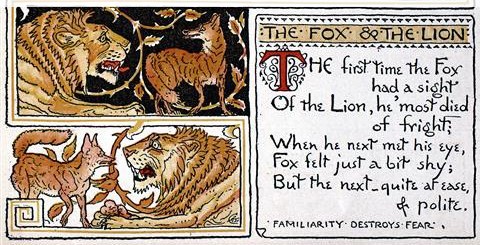
#disney#disney meta#frozen#frozen meta#frozen fandom#prince hans#hans#redeem hans#niccolo machiavelli#the prince#elsa#anna#disney villains#disney princes#redeemed villains
95 notes
·
View notes
Text
On Force-Sensitivity Demographics
AKA: Exactly How Many Force-Sensitive People Are in the Galaxy; and Is This Genetic?
This is something I think about from time to time--I’m not sure exactly why now is one of those times, except that I set up this blog not too long ago and therefore was reading back through some old metas I’d written/bookmarked/etc.
Anyway, since it has been on my mind, I figured I’d go ahead and get my thoughts on the matter into some kind of coherent format!
And said thoughts basically boil down to one big ol’ shrug emoji, because I don’t think there’s enough information to say for sure.
Let’s start with the first question--how many Force-sensitive people are in the Galaxy?
So, the main evidence we have for any type of discussion on this subject is the size of the Jedi Order, which is stated to be roughly 10,000 beings as of the fall of the Republic. But there are a couple problems with extrapolating from that number.
First, who exactly does that 10,000 estimate include? Is it every Jedi currently known to be alive according to Temple records? Is it all active Jedi Knights/Masters/Padawans? Is it limited to full Jedi who have passed their Trials? Does it include retired Masters? Younglings and initiates?
Second, even if we take it as the most inclusive number possible (i.e., every living member of the Jedi Order from Master Yoda down to the three-month old that got brought in the day before the end), that’s not necessarily an accurate barometer for the percentage of Force-sensitives in the general population. For one thing, there are entire populations that are outliers (i.e., Dathomir, which seems to have a higher percentage than the galactic average, to the point where I kind of think it’s some kind of genius locus/an entire planet of people who are sensitive to a perceptible degree), and we don’t know how many of those/how sizeable they are.
With that in mind, using just the Jedi Order is probably not super-accurate to the galaxy as a whole. See above, re: Dathomir; not to mention other populations such as the Bardotta and Lasat that seem to have strong native traditions and generally don’t send their children to the Temple. Also, given that there’s a gradient/some level of variation in terms of raw strength/natural ability above whatever threshold the Jedi consider the minimum for induction into the Order, there probably is below it, too. Meaning, there’s most likely an unknown population of people who are perceptibly more sensitive than Joe Average, even if they don’t quite meet the Order’s standard, whatever that may be. I mean, you could view Force-sensitivity as a simple on/off switch, with…IDK…varying brightness in the bulbs once they’re turned on, but that seems weird/doesn’t really hold up for me. Especially given that, at least in Legends, certain species (such as the Iktotchi, IIRC) have a higher baseline level of Force-sensitivity than Humans do. Granted, the gradient issue is probably more relevant to the second half of this discussion (on possible heredity), rather than broad population estimates, because at some point a line has to be drawn; still, I thought it best to mention it.
Third, even if we exclude populations like Dathomiri/Bardotta/Lasat and people who are sensitive enough to Do Things, but not necessarily above whatever threshold the Jedi require, that 10,000 is still probably not a great sample, because it’s fairly limited. It consists of people who were a) born in the Republic and/or found by a wandering Jedi within the appropriate age range, whatever that may be, and b) had parents who were willing to give them up for adoption. I’ve touched on this before but the highlights: we don’t know how many letter B excludes, but even letter A probably doesn’t catch all the eligible people within that parameter.
And I can say this because of Palpatine.
Based on his background, coming from a sector capital (if a relatively rural/minor one) and born to parents who had a fair amount of personal resources, it’s hard to believe that he wouldn’t be identified. I mean, yes, one explanation is a handwaved because Destiny said so/the Son chose his champion and made sure he would be found by the correct teacher, but it’s just as likely that there are kids, even from highly visible populations, who slip through the cracks--let alone children from less visible populations. Especially since, to my knowledge, there’s not actually a whole lot of information out there on exactly how candidates for the Order are identified, so it’s hard to say how many people, like Palpatine, slipped through the cracks.
Now, to be fair, I don’t know if this possible increase in the numbers of Force-sensitives makes a significant difference in terms of the percentage they make up of the overall population, given the sheer size of the galaxy. But that just brings me to question #2, because I think it does mean that determining whether Force-sensitivity is genetic is really, really hard to determine.
Again, since most of our information comes from the Jedi Order, we’re dealing with a potentially skewed/small/nonrepresentative sample size of people who, generally speaking, do not have biological children. In addition, we don’t actually know a whole lot about who more than, like, a hundred or so of those ten thousand are? Of whom we do see one set of cousins (if I’m remembering current canon about Adi Gallia and Stass Allie correctly) and one sibling pair (from the Order 66 arc in Clone Wars; though they are twins, which by common laws/tropes of Fantasy Genetics makes things Special/weird/more likely to be magic/Force-sensitive).
Anyway, that evidence is not the greatest for making broad generalizations. Basically, we can extrapolate that you don’t have to have (Jedi-level) Force-sensitive parents to be Force-sensitive yourself. Meaning, the ability itself can turn up as a completely spontaneous mutation, so to speak--which, while not the best term, is the one I’m going to use from here on out for convenience.
But that doesn’t necessarily say anything about the likelihood of a Force-sensitive parent passing on said mutation and having a Force-sensitive child.
And that, we really can’t answer definitively, since the only people whose bloodlines we can track that are known to contain multiple Force-sensitives are the Skywalkers (who are outliers adn should not be counted) and Maul and his brothers (who are Dathomiri and thus, as discussed above, most likely a Special Case).
So here, we enter Wild Headcanon territory.
That disclaimer aside, my personal take on the heredity question, is that the more sensitive you are, the higher your chances of producing a Force-sensitive child. So, for example (and pulling numbers out of thin air), Joe Average has a 1/20 chance of having a Force-sensitive baby through a spontaneous mutation; the average Jedi Knight or someone with the equivalent level of potential has a 50/50 chance of passing it on; someone on Palpatine or Yoda’s level has maybe a 3/4 chance; and of course Anakin’s children will be Force-sensitive regardless (but, again, outlier/Life Incarnate/I’m pretty sure the main reason it took three years to conceive the twins was that he and Padme were both using like five kinds of birth control and also didn’t actually have all that many opportunities to sleep together--buuuuuut that is a discussion for a separate post).
Anyway, this still means that Joe Average could have five Force-sensitive kids in a row and a Jedi-level Force adept could have five kids and none of them are sensitive, because these probabilities are for each individual child. In essence, while rare, it is possible to roll a die and get, say, five straight nat ones (as D&D players will probably know); and it’s…actually more likely than that to flip a coin and get tails five times in a row, according to my vague memory of high school math and how to calculate probabilities.
[Tangentially, this explains Korkie in my head, since he seems to be either Force-null or somewhere on that sliding scale between zero and the Jedi threshold. Because I do headcanon him as Obi-Wan and Satine’s biological son (though I think Bo-Katan is legally his mother; but that’s something planned for my fic blog rather than here); and the cointoss turned up tails.]
And this is just the most basic, surface-level analysis, without even considering the impact of the second bioparent in the equation (not that I think this fits neatly into a Punnett square or anything), or what happens if you’re dealing with a Force-null child of a Force-sensitive parent; or varying probabilities depending on where the nominally non-sensitive parent falls on that sliding scale I keep mentioning…but most of that would be well beyond my half-remembered high-school bio/math understanding of probability and genetics soooo yeah.
In conclusion--with regard to the questions of how many Force-sensitives there in the galaxy; and even more so whether or not Force-sensitivity is at all genetic, the answer is ¯\_(ツ)_/¯ because there isn’t enough information to say for sure one way or the other.
(Note: it probably also bears mentioning, re: the heredity question, that families in the GFFA seem to run fairly small? Like, I can only think of one confirmed example of a family with more than two kids in canon (Maul and his brothers; who are Dathomiri and therefore possibly not a good example for determining Force heredity) and one possible one (Satine, Bo-Katan, and a possible third sibling; though to my knowledge that has never been 100% confirmed/made explicit, and neither of the two we know for sure exist are Force-sensitive). Everyone else I’m coming up with is either an only child or one of two siblings, or not specified. I can’t even think of all that many in Legends, though there are a few more there. To be fair, we don’t actually have a very broad sample of families, either, so… ¯\_(ツ)_/¯)
3 notes
·
View notes
Text
the making of enoshima junko
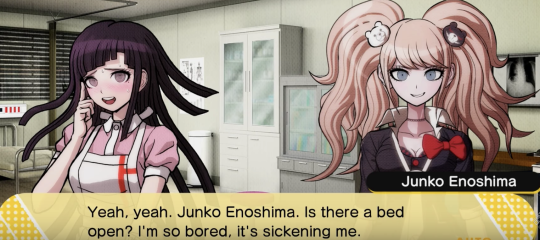
junko is a fascinatingly funny villain who defies so many attempts to understand her, reason with her, or empathize with her. i think the creator of danganronpa even said she was made to be a villain who’s impossible to relate to or understand. BUT HERE I AM, writing a meta about the inner workings of her mind and her motivations as a villain and how much of a tragedy she really was, because i am out here empathizing with her and loving her with all my heart.
i think she can be difficult to understand, and it’s easy to give up and explain away her actions as just “an obsession with despair” but there’s so much more going on that i just can’t leave it at that.
SO HERE WE GO: what the fuck is going on in junko’s mind?
[contains MAJOR spoilers for the first and second games and danganronpa 0; includes content from unlocked bonus mode games]
to start things off: if you said that junko's motivation for destroying the world was just because she wanted to and for no deeper reason, you'd be correct. but like, you wouldn’t be right.
critical to understanding junko is danganronpa 0. we learn a few things about junko, the first and most important of which is the fact that her TRUE shsl talent isn’t fashion, or despair -- but analysis.
junko has a mind that works very, very well. scarily so. she has a brain that:
after watching someone fight for approximately three minutes, can near-flawlessly predict their moves and lay an elaborate trap to knock them out despite the fact that they are much faster and stronger than junko
in fact, she predicts them SO WELL that she doesn’t even have to LOOK at them in order to dodge their attacks while they’re chasing her
just... three minutes, and she completely saw through their fighting style. that’s unreal.
can analyze others’ speech patterns, thoughts, & mannerisms, to the extent that she can nearly word-for-word guess what someone is thinking or going to say. so we get gems like this:
“If my prediction is correct, he‘s going to realize very soon that the source of my newfound power lies in my notebook.
[...]
Madarai reached a conclusion. There was some kind of secret hiding in that notebook.”
“Does [Junko] think this is a game?!
‘You‘re probably asking yourself if I think this is a game, but I‘m not gonna tell you either way...’”
can generate countless connections and possibilities at a moment’s notice: (from the bonus “ultimate talent development plan” mode)

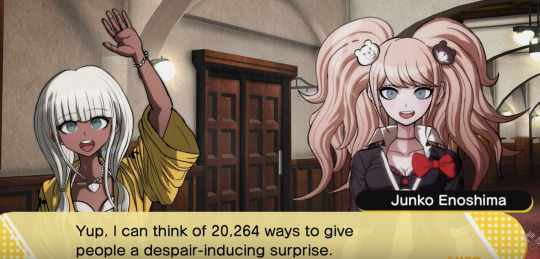
can anticipate the way everyone is going to react to certain situations, as if they aren’t all complex independent organisms but instead actors whose lines she’s reading off a script...
junko has a mind that accumulates data about the world very, very rapidly, and makes this.... GIANT database of behaviors, and patterns, and predictions. she's smart. she can lay a plot that accurately predicts the actions of people MONTHS in advance, to the point that she can make her plots run almost entirely on the reactions she predicted other people would have; she can craft a plan that would run completely in absentia of her, powered only by the decisions she predicted others would make.
that's what she does in dangan ronpa 0. and it goes down without a hitch:
“Just answer me!” Frustrated, Matsuda raised his voice angrily. “What is it you want to achieve? Just what is it you‘re trying to do?”
Enoshima tilted her head slightly to the side.
“Nothing really. I don‘t want to do anything.”
“... What?”
“It‘s too late, I shan‘t do a thing. I‘m not going to do a single thing, I have everyone else doing it for me. Guys like the student council, the headmaster or the steering committee... and also that girl who you absolutely adore... EEEEVERYONE is running around, doing my work.”
so what you learn from this is that junko is frighteningly good at breaking down the behavioral patterns of the world & people around her. good enough to predict other people, down to their thoughts, speech, and decision making process... good enough to predict fashion trends and make a name for herself as the ultimate fashionista... good enough that, with a little bit of time and observation, she can read her environment like it’s an open book.
good enough that she’s completely, utterly bored.
bored of talking to people because their responses are SO predictable, bored of schoolwork because it's SO easy, bored of doing things because it's just the same patterns repeated over and over and over again. junko can predict people months in advance; reading people in the moment must be a joke.
for example, during her events in the bonus “ultimate talent development” game mode, junko has an encounter with asahina aoi and hanamura teruteru, in which hanamura invites asahina to his kitchen and junko cheerfully inserts herself into the conversation. there’s a little banter that junko takes part in at first, but then, before hanamura can get around to telling asahina what he invited her to the kitchen for--


turns out hanamura wanted asahina to taste-test some of his donuts. before he’d even mentioned it, junko figured it out. and to her, it was completely trivial to figure out.
this is what daily life is like for her: nothing new, nothing exciting, just an endless parade of people moving according to a script. a script that junko read, divined, memorized, learned by heart, and is now completely and utterly bored of.
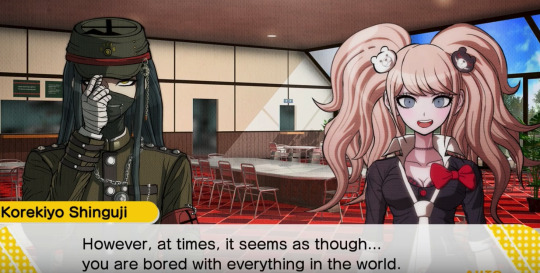
life for junko is the perpetual, endless torture of boredom. it is about as engaging as being locked in an empty room with nothing to do but watch a clock ticking away at the time.
and if you had no way to leave that room, no way to escape -- eventually you’d have nothing to do except take apart the clock itself, wouldn’t you? how long could you hold out before -- out of sheer frustration and the need to do something -- you’d try to dismantle the clock piece by piece?
what junko wants, more than anything else, is relief from the numbness of boredom. she wants stimulation! interest! something exciting, something that can stir her to passions she could never reach under the endless cafard that weighs her down so in daily life! the highs of hope and joy, the lows of utter devastation and despair... how could she not chase that? she so desperately wants it! she wants that excitement! she wants, more than anything else, to feel.
and boy howdy does despair make her feel. taking, for example, this passage from when junko personally murders her beloved matsuda yasuke (dangan ronpa 0):
[Junko] loved him so much, that irreplaceable existence, more important than anyone else, almost obsessed with him to the point of insanity, always wanting to be within his embrace, even living in a world with only him would be fine. And by losing that incredible existence, just how much despair would [she] fall in?
She nurtured her love for Matsuda all this time just to get a taste of that feeling. Seeing her loved one be smothered by despair during his last moments, she pretty much lived to experience that spectacle.
Finally getting to taste that despair...
“...INCREDIBLE!!”
It was more than anything she could have hoped for.
"Too depressing! Too good! My chest is gonna tear open! This is true self-loathing! I want to die! This is! This is the despair that comes from losing a loved one!”
While Enoshima‘s being was assaulted by that despair, she kicked Yasuke Matsuda‘s corpse with all her strength.
“Amazing, amazing! Amazingamazingamazingamazingamazing!”
and again:
Looking at this notebook brought back memories of Yasuke Matsuda. Remembering him, she could feel her chest tightening. Consumed by disgust at what she did to him, she was compelled to cry and scream out. I want to forget this already! I want to just get rid of this notebook!
“Aha! All the more reason to keep this on hand!”
despair is just about the only thing that can reliably make junko feel something -- anything other than the utter boredom that plagues her so, that dogs her footsteps wherever she goes and eats away at her mind. it’s the only thing that can bring her relief. it’s her drug, her nepenthe, her poison of choice
and for this reason alone, despair is the only thing that junko can cling to. as long as she’s bored, as long as she’s trapped by the very nature of her own mind, the only thing she can do is chase the purity of despair.



in fact, it would be accurate to say that despair is junko’s only hope for being satisfied with her existence, and her only hope to be happy. Or, as dangan ronpa 0 puts it, “Junko Enoshima wishes for despair above anything else [...] finds hope within despair more than anyone else.”
with this context, we can finally understand what ikusaba mukuro tried to say about her sister (again, in dangan ronpa 0):
“[Junko] has lived her whole life with despair by her side. She lived while immersed in despair. That‘s why she began looking for despair in others. She learned to enjoy pushing people into despair [...] she learned to enjoy inflicting despair onto herself. That‘s how the link to despair began. As she chased down despair, she pushed it onto others on the way. Doing so, it caused her to desire falling into despair even more...and because of that chain to despair, the Super High School Level Despair was born.”
junko has been, and i quote, “bored since the day [she] was born.” despair is the only thing she has. by causing others to fall into despair, she can experience it herself. the more she cares about her victims, the better, too -- the worse she’ll feel, and therefore, the better she’ll feel. this is why junko gives so much special attention to causing the despair of those she loves the most, i.e. her childhood love matsuda yasuke, her sister mukuro, and her classmates at hope’s peak.
BUT! there’s also an added bonus to all her convoluted plans for despair. it involves setting up situations that she’s never before seen -- and therefore, situations she can’t entirely predict! her pursuit of despair is her ticket to possibility of an unpredictable factor in her life -- and for someone as endlessly bored as junko? that’s as good as it gets. something exciting! something new!
and if she doesn't know what's going to happen, then junko gets to feel things like ANTICIPATION, or SURPRISE, or FEAR, or DELIGHT -- things that are so often denied to her in her daily life because she can predict so much that she's just bored all the time!!! everything is boring!!! an endless plain of dull, boring nothingness with nothing to engage her for more than a minute, and junko HATES it, junko would do anything to find something even a little interesting or surprising in this world! she’d murder, she’d weaponize her empathy against herself, she’d destroy the world! she'd do anything to feel something besides boredom again!!!!
for junko, "despair" is associated with excitement and relief. she would pursue it to such a degree that she'd destroy the entire world and herself while she's at it -- just so she can feel something besides the endless boredom and nothingness that has burdened her all her life.
of course, that means there’s a little dissonance in what junko claims to stand for. for junko, true despair would probably be akin to being locked in that empty room with the clock, and never letting herself take the clock apart. it would be... giving into boredom. and that’s something she could never bear to do.
so then we have lines like this:
With the sullen expression still on her face, Enoshima trotted towards Madarai‘s dead body. “It‘s your fault, y‘know. Take that!” She started jabbing her toes into the body. “Hey, say something! What‘s up with being so easy to kill?! You should‘ve at least made an effort to disrupt my plans! How can I possibly despair like that?!”
despair is about the thrill! the excitement! and yes, junko is making all these plans, hoping that they’ll succeed -- but how can junko despair if there isn’t at least the excitement of defeating all those who would desire to challenge her?! if there isn’t at least something a LITTLE new, a LITTLE bit unexpected?! she can’t, thats what! at least let your despair drive you to do something interesting and new for once in your life!
or this:

in all probability, junko -- more than anything -- would love an enemy who she can’t defeat. someone who, no matter how much she tries, she simply can’t overcome! because more than anything, that would represent a challenge -- and therefore, something exciting. junko’s happy ending is meeting her match, and more.
too bad she doesn’t have anyone like that.
so instead, junko has nothing to test her mind against, nothing to occupy her... nothing to save her from the boredom eating her alive. and so, from dangan ronpa 0:
Everything turned out just the way she expected...
Everything turned out just the way she hoped... and so she despaired.
“But, it‘s so unsatisfying when your plans always succeed... Whose fault is this? Is anyone going to take responsibility?”
and again, from the last trial of the first game:


in the end, despair is only a poor substitute for what junko really wants; a pale, cheap imitation. what junko wants the most -- excitement, purpose, relief from boredom -- will forever be out of reach, as long as she’s trapped by the confines of her own mind.
i think the saddest part about danganronpa 0 is that we get a look at what it would take for junko to be really, truly happy. junko wipes her own memory; more than that, she makes it so her long term memory is nonexistent, and she forgets things almost as soon as they happen. and the kicker is that junko is happier like this, living as the forgetful otonashi ryouko, than she was as herself.
because she constantly forgets everything, she’s not bored. everything is a new experience. she’s happy to be with matsuda and feels no need to chase despair. as ryouko, junko is still self centered and somewhat callous, but she’s also passionate, excitable, cheerful, upbeat. she cares about those who are important to her, and would try her best to preserve their happiness.
but when her brain is in perfect working condition, she can only helplessly fall back into the hopeless boredom that she hates so much -- and that she’d do anything to escape.
it is a boredom so complete, she can’t stand it. she can’t even stand herself. her own predictable self, whose mind, thoughts, actions she knows so well... in danganronpa 3, junko actually has something of a seemingly stable personality, but by the time the end of the first danganronpa game rolls around...
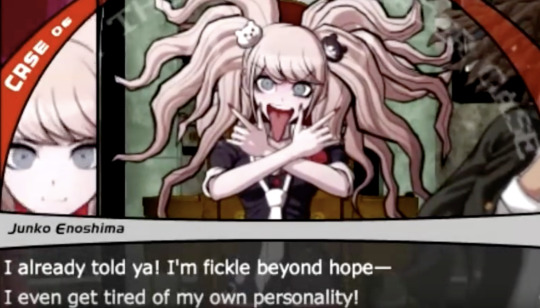
... she’s so bored of even herself that she feels the need to constantly switch up her personality.
the sad thing this implies is that junko’s mind just -- couldn’t take it, anymore. it gave out under its own weight. her boredom was so absolute, her mental state could only deteriorate. she could only become increasingly unstable, and increasingly desperate to find something, anything, to keep her boredom at bay.
no wonder junko has this sentiment, then:

junko’s analytical mind is her greatest blessing, but also her greatest downfall; the source of her boredom, and thus, her descent into despair. she went to all these efforts to relieve herself of her boredom; and to do that, she chased despair, defined herself by the concept, even. but in the end, what junko needed the most was an escape from being herself.
for someone like that... no wonder she welcomed death with open arms. here it is: the end of the line. no more boredom -- no more anything, in fact. only the fear, the terror, the excitement of her execution -- the great unknown -- and then, her death.

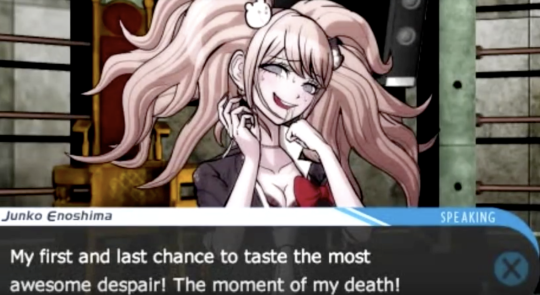
the tragedy is that for junko, this was the only happy ending she could have. as long as she was alive, she’d never be happy, never be satisfied. death, for her... was a relief.
so when naegi started to tell her that executing herself wasn’t necessary--





she became angry. this was all the wanted in life, this was all she could ever hope for. this was, in her eyes, the only way for things to end.
this is the tragedy of junko enoshima: a girl who, in a desperate effort to keep herself from going insane, destroyed everything she touched.
#junko enoshima#dangan ronpa#meta#i thought i was over how much i love junko but then i got back into danganronpa so here we are#im writing this because she's such an interesting and weirdly relatable character for me#and also because i wanted to talk about her ultimate talent development game because it was so fucking funny
952 notes
·
View notes
Text
Destiel Chronicles
(Vol. VI)
It was a love story, from the very beginning.
(4x16/4x20/4x21/4x22)
Prelude to The fall
Hi again!! And now we are here, in the last volumes from season 4.
I'm gonna talk in this one about the foreshadow to the fall, and I will extend Castiel's fall to next and last volume too.
I want to mention my friend @agusvedder , she made the gifs specially for this metas and discuss with me the Destiel scenes. Thanks a lot girl! 😘💕
Ok, without any other addition, let's start with the analysis.
Dean... I can't...
Cas was observed by his superiors, they watched every step or word he said to Dean. Even so... When Dean was praying for help, Cas went to see him immediately.
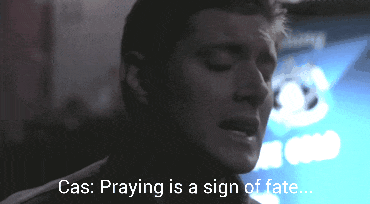
The answer to Dean's prayers was immediate. Dean had sounded desperate, and Castiel couldn't reject go to see him. (My heart...)
Dean asked CAS to help him, but Castiel had his orders... He already had lost his position for getting too close to this man, and now... Now he was desperately asking him for help...
CASTIEL: I'm not sure what I can do.
DEAN: Drag Sam out of here, now. Before Lilith shows up.
CASTIEL: It's a prophecy. I can't interfere.
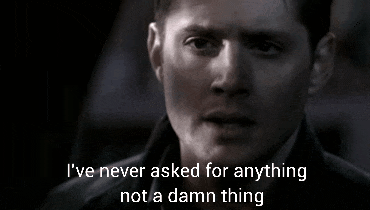
DEAN: Why? 'Cause it's "divine prophecy"?
CASTIEL Yes.
DEAN So, what – We're just supposed to sit around and, and wait for it to happen?
CASTIEL I'm sorry.
Let's just stop in this scene... I want you to see Dean's face in the gif... He's desperate, and he's trying hard to convince Castiel, to drag him into his circle, but Cas had Heaven breathing on his neck ... He wanted to help him.. but he couldn't.
And I put in red those words because this scene, my friends, is a huge parallel of the fall, the scene in the green room in 4x22. Even CAS is saying I'M SORRY AS HE WILL SAY I'M SORRY TOO IN THAT SCENE. How this scene ended? Well after Dean getting mad at him ...
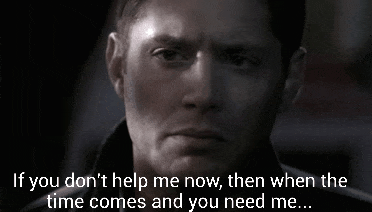
Dean passes by Castiel, but look at Castiel's sad face... He doesn't want Dean get mad at him... He really wants to help him, so... He decided a strategy to "HELPING DEAN INDIRECTLY" by giving him some important information about Archangels protecting Prophets...
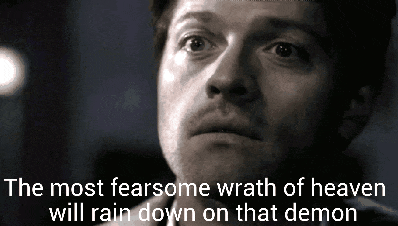
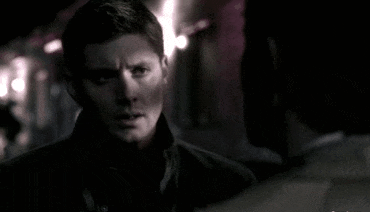
Castiel looks up, at Heaven...he knows this will cost him a lot... And it will as we will see in "The Rapture" (in volume V). But after looking up at Heaven, he fixes his eyes with Dean's... He needed to know if Dean had get the message... And he did...
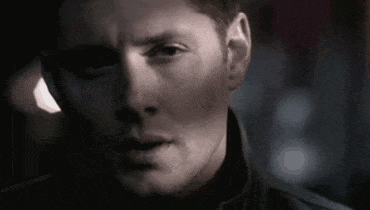
Castiel even greeted him with a good luck. He's playing with fire here...
So yes! Huge foreshadow here my friends... The good thing is Castiel finished helping Dean... As it will occur in 4x22.
Second time Dean prays...
In the episode 4x21, after Castiel received his punishment in Heaven and was brainwashed, Dean prays again desperate, bc Sam was locked trying to get rid from demon blood. That was very hard for Dean, and he was suffering horribly for his brother. He needed help. But this time Castiel attended the call... Two and a half hours later.
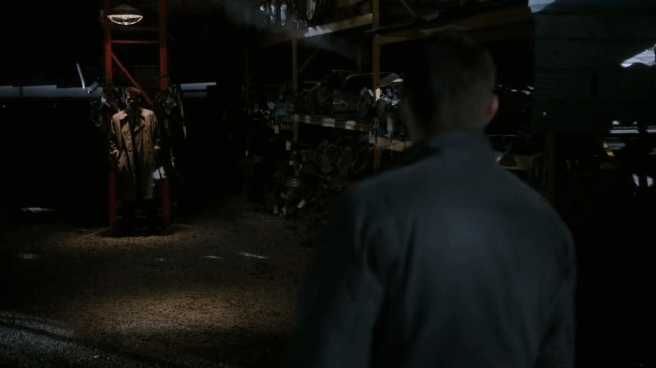
Look at Dean's face, he is in pain, and he looks at a side because he isn't just in pain bc his brother is locked and fighting against that demon blood, but because the only help he could ask for didn't came, Castiel didn't came in Dean's desperately prayer. And his face is screaming, with a little tiny of shame, WHY ARE YOU DOING THIS TO ME? CAN'T YOU SEE I'M SUFFERING BC MY BROTHER AND YOU MADE ME WAIT HERE SCREAMING FOR YOUR HELP? WHY?
Dean is hurt because Castiel made him wait two and a half hours knowing he was in pain.
He maybe recalled that time in the motel, when CAS answered his prayers right away, and helped him with Sam... And now...
CASTIEL: What do you want?
DEAN: You can start with what the hell happened in Illinois.
CASTIEL: What do you mean?
DEAN: Cut the crap. You were gonna tell me something.
CASTIEL: Well, nothing of import.
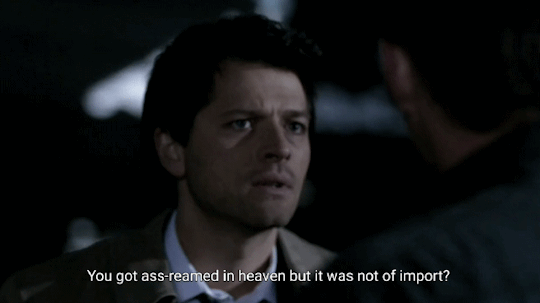
Cas is marking Dean here that Heaven is watching. They are listening, look at his face, he knows Dean pushing so hard can make him break, he wants to help, but he can't, he was brainwashed, but that crack is still there, that crack connects him with this man, his weakness.
Dean looks at him, when he said I CAN'T. Maybe he get the message there. They are not alone. But even so, he insists .
CASTIEL: Get to the reason you really called me. It's about Sam, right?
DEAN: Can he do it? Kill Lilith, stop the apocalypse?
CASTIEL: Possibly, yes. But as you know, he'd have to take certain steps.
DEAN: Crank up the hell-blood regimen.
CASTIEL: Consuming the amount of blood it would take to kill Lilith would change your brother forever. Most likely, he would become the next creature that you would feel compelled to kill. There's no reason this would have to come to pass, Dean. We believe it's you, Dean, not your brother. The only question for us is whether you're willing to accept it. Stand up and accept your role. You are the one who will stop it.
This, over there... 👆 That's Heaven manipulation. This words were bout on Castiel's mouth. He was sent by Heaven specifically to fulfill a mission... To make Dean accept to obey Heaven. They sent Castiel bc they know Dean and Cas relationship is special enough to make Dean fell for manipulation.
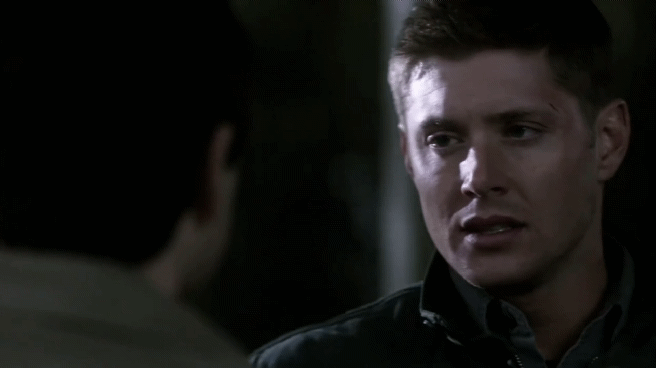
And he fell for it ... Castiel is listening, he knows Sammy is Dean's limit. And he just used him, as Heaven asked him to do it. And he is hating himself for that for sure...
CASTIEL: If it gives you comfort to see it that way.
DEAN: God, you're a dick these days.
Dean is disappointed with him, this isn't the Castiel he knew, the Cas that helps him, the Cas that sat by his bed in the hospital, watching him cry, and telling him the whole truth he has. Or the Cas that confessed him in that park that he had doubts and he wasn't a hammer. Yes ... He is just like any other angel now.
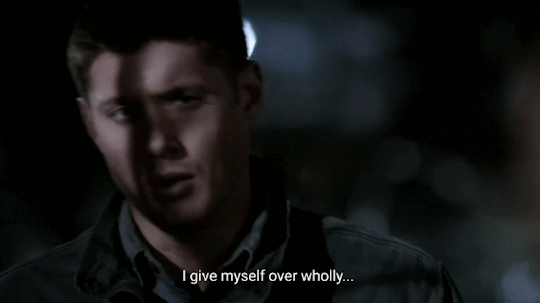
So... To the Hell with everything, Dean accepts the offer, he was really desperate. Castiel had fulfilled his mission...
Castiel's incongruent behavior
... or part of it. Sometimes I felt he was on a test by Heaven, they should ask Castiel for his loyalty, and they sent him to do three things he wasn't agreed. He maybe wanted to answer Dean's prayers right away, but Heaven should said to him: NOT YET CASTIEL, LET HIM WAIT. LET HIM BE MORE DESPERATE, WE NEED HIM MORE DESPERATE.
And the second mission was to release Sam. You can see the scene and the expression in Castiel's face is eloquent. He is suffering by doing things he is against it, he had his doubts still there... Why he has those doubts after the procedure of brainwashing?
The third thing he had to do, is very very symbolic: He called Anna, to a trap. Angels took her to Heaven. Heaven locked Castiel's rebellious feelings and doubts. And he let that happen... But not for so long... Because he was made to be free.
To conclude:
Season 4 showed us a parallel with Dean praying for help worried about Sam, in the first one (foreshadow of Castiel's fall in the last episode) CAS answered his prayers right away and, although the big eye of Heaven over them, he ended by helping Dean.
The second time after receiving Heaven's punishment for give information and be too close to that human, he didn't answer right away, maybe by Heaven's order to make Dean accept obedience to Heaven.
Castiel was doing the three missions with doubts and pain. Things that will lead him to the fall.
His hear and his actions were totally disconnected.
I hope you like this, sorry because it took me so long, is beacuse I'm writing too metas about the ongoing episodes of Supernatural!
Tagging @metafest @gneisscastiel @mrsaquaman187 @magnificent-winged-beast @emblue-sparks @agusvedder @weirddorkylittlediana @michyribeiro @castiellover20 @whyjm @koshisekisen @legendary-destiel @a-bit-of-influence @thatwitchydestielfan @misha-moose-dean-burger-lover @lykanyouko @evvvissticante @cheerstofandomfamily @drsilverfish @savannadarkbaby @angelneedshunter @trickster-archangel @dea-stiel @poorreputation @bre95611 @thewolfathedoor @charlottemanchmal @neii3n @deathswaywardson @followyourenergy @dean-is-bi-till-i-die @hekatelilith-blog @avidbkwrm @anarchiana @mishka-the-angel-of-saturday @dickpuncher365 @vampyrosa @hippyatheart80 @xsghn @foxyroxe-art @authorsararayne @anonymoustitans @mybonsai1976 @love-neve-dies @wildligia
Note: If you want to be tagged in my Destiel Chronicles, please let me know.
You can read the other volumes here:
Vol. I
Vol. II
Vol. III
Vol. IV
Vol. V
Buenos Aires April 9th 2019 12:33 AM
80 notes
·
View notes